#PERCEPTUAL POSITIONS
Explore tagged Tumblr posts
Text
Shoutout to all my mentally ill folks with learning disabilities❤️
Shoutout to all mentally ill folks with Dyslexia.
Shoutout to all mentally ill folks with Dysgraphia.
Shoutout to all mentally ill folks with Dyscalculia.
Shoutout to all mentally ill folks with Dyspraxia.
Shoutout to all mentally ill folks with Auditory Processing Disorder.
Shoutout to all mentally ill folks with Language processing disorder.
Shoutout to all mentally ill folks with Nonverbal learning disabilities.
Shoutout to all mentally ill folks with Visual perceptual deficits.
Shoutout to all mentally folks with visual motor deficits.
Shoutout to all mentally ill folks with ADD.
Shoutout to all mentally ill folks with ADHD.
Your resilience is something unfounded, with rightful frustration ever so present, you still persevere. Continuing to live on, despite so much holding you back, is admirable. Continue to learn. Continue to thrive. Continue to prove that you have what it takes, because you do.
#mental health#positivity#self care#mental illness#self help#recovery#ed recovery#pro recovery#actuallytraumatized#dyslexia#dysgraphia#dyscalculia#Auditory processing disorder#Language processing disorder#Nonverbal learning disability#Visual perceptual deficit#shdhdhs#add#bpd#childhood trauma#trauma#self h@rm#actually bpd#mentally fucked#thinspø#⭐️rving#study or#body positivity#self love#self healing
13 notes
·
View notes
Text

#different perceptual realities can coexist#when we merge them together and accept and embrace all experiences and feelings it expands Source conciousness#we can get easily trapped in our own suffering & despair & shame & victimhood (which could all have very real roots)#but when we deny ourselves the gift of elevating out of it through radical acknowledgment and acceptance#then we hold ourselves down. we drown ourselves. often for the ‘#often for the ‘comfort’ of others#self sacrifice is the most self centered thing you can choose in this life. acting in your own best interest is the best for everyone#we are all one#2024 is the time to get serious#the veil is thinning & the divide is growing starker. please make sure you choose the highest path for yourself#i see sobriety & positive mental change & clarity & responsibility & breaking free from negative cycles#i know that you see the Truth shining through#i know that you always have. i know you are DONE with sacrificing yourself. it’s time to get to actually know yourself & your emotions#i am proud of you. i will see you on the other side. i can’t wait.#mine#the feeling for 2024#kumeyaay#kumeyaay art
1 note
·
View note
Note
What’s your take on Pelle wanting a romantic relationship irl? Do you think it’s something he would’ve wanted? Or was he afraid that he was too odd for someone to accept him? (I don’t know if that sounds harsh). Since you think that he was sensitive.
Btw I love your analysis girl 🫶
I'm not so sure about relationships, but I firmly believe that he wanted to connect to someone, somehow.
In terms of friendships, I think Øystein was the closest friend he had (at least during his time in Norway), but even so, Pelle didn't open up much for various reasons that include the environment in which he was at that time and most probably trust issues. Talking at some point with Old Mayhem, she described an 'invisible wall' between Pelle and his friends/ the world and I couldn't agree more. It feels like Pelle would've wanted this meaningful connection with someone, anyone, but unfortunately, he didn't manage to form it. I genuinely think this had a massive contribution to why he took his own life.
I don't know if he would've wanted a relationship because a relationship comes with a lot of stress and pressure for being in a commitment, attending someone else's needs, etc, but he definitely felt alone and forgotten in this world. After all, he wrote in his last lyrics 'No one will ever miss you'. He longed to be seen, to be given attention and importance. There are a lot of signs of emotional neglect in how he developed, but I will try to keep it short. I consider him as being in the autism spectrum and a relationship would most likely feel overwhelming, especially since he would lack experience, confidence, etc. But if I have to imagine him in a relationship, I can only imagine him being with someone patient and calm.
People with strong trauma responses, PTSD and those who suffer from personality disorders need a partner who is a bit more mentally equipped to manage stressful situations than your average Joe. To see improvement in Pelle's mental health, he would need a very patient and mature partner.
Love can heal a broken heart. I am one of those people who believe that no matter how broken you are, if you find someone to love you for who you are, someone who is willing to accept you with all of your inner demons, with the the good and the ugly, you can start to heal. Currently, I'm following this process myself. The human brain can be programmed and re-programmed. We are very adaptable to our environments and if we make our senses realize we're not in danger anymore, we can finally allow ourselves inner peace. This is why I believe that Pelle could've been saved.
Hypothetically speaking, Pelle would have a hard time adjusting to a relationship. He was quite rigid, stubborn and unwilling to change for others. To make a relationship work, you need to make some compromises. Another aspect that I want to point out is that Pelle had outbursts or 'episodes' of impulsive behavior when he was living. That would be a serious problem. Øystein (and Metalion, if I remember correctly) had to literally hold Pelle down when he suddenly wanted to 'go to Transylvania'. The question is: Would someone be able (and willing) to deal with this again and again? He would definitely need psychiatric treatment, but would he accept that? There are so many factors that would make dating Pelle a real challenge. I also believe that he was suffering some sort of perceptual delusion. I won't call it Cotard's syndrome since it is not recognized in the DSM and since we have very little information about it, but my honest opinion is that he might have had something more that just depression and I'm kind of pointing towards Major Depression with Psychotic Features. If you believe something else, that's fine. Everyone does their own research and reaches their own conclusions.
I do think he was sensitive and there would've been room in him to grow positive feelings towards someone, to form a meaningful connection and learn to trust again. In the end, it doesn't matter if he would've had a romantic partner or a best friend, he would've liked to form a bond with another soul, someone who understands him, respects him and is there to stay.
I imagine him as being very honest, capable of showing tenderness, being mindful, quiet, contemplative and trustworthy in a meaningful relationship.
Sorry for my late response, I had an awful weekend.
92 notes
·
View notes
Text
Mrigashira: The Price of Speaking The Truth
I have been studying the themes and patterns of Mrigashira nakshatra for a while and I thought it's time I made a post about the same.
The myth associated with Mrigashira involves Daksha, the son of Brahma. Daksha organized a grand Yajna (a ritual) but intentionally avoided inviting his daughter Sati’s husband, Shiva, whom he despised. Sati went to the ritual without Shiva’s consent, where Daksha insulted her and Shiva. Sati couldn’t bear the humiliation and jumped into the sacrificial fire. Upon learning of Sati’s death, Shiva became furious and destroyed Daksha’s yajna. Yagya, the presiding sage, turned into a deer and ran away, but Shiva caught up and killed him. His head became the Mrigashira nakshatra, which symbolizes sacrifice. (there are multiple myths associated with each nakshatra and another myth about Mrigashira involves Rohini, Brahma's favourite daughter leaving heaven to escape Brahma's incestual interest in her and taking the form of a deer on earth)
From this myth, we know that making a sacrifice for doing the right thing is a theme in the lives of these natives (Yagya was only overseeing the ceremony, he did nothing wrong, he never insulted Shiva, he was just doing his job). Another prominent theme is escaping someone's wrath or escaping to seek safety.
The yoni animal of Mrigashira is a serpent.
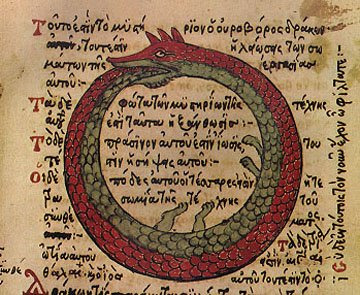
Serpents feature prominently in many mythologies and are commonly associated with renewal and transformation.
The ouroboros represented in this picture is a serpent eating its own tail. Carl Jung, saw this as a basic mandala of alchemy and said:
"The alchemists, who in their own way knew more about the nature of the individuation process than we moderns do, expressed this paradox through the symbol of the Ouroboros, the snake that eats its own tail. The Ouroboros has been said to have a meaning of infinity or wholeness. In the age-old image of the Ouroboros lies the thought of devouring oneself and turning oneself into a circulatory process, for it was clear to the more astute alchemists that the prima materia of the art was the man himself. The Ouroboros is a dramatic symbol of the integration and assimilation of the opposite, i.e. of the shadow. This 'feedback' process is at the same time a symbol of immortality since it is said of the Ouroboros that he slays himself and brings himself to life, fertilizes himself, and gives birth to himself. He symbolizes the One, who proceeds from the clash of opposites, and he, therefore, constitutes the secret of the prima materia which unquestionably stems from man's unconscious."
It speaks of human nature and how we must consume the opposites within ourselves to integrate into one whole being. Every nakshatra serves a cosmic purpose. Each nakshatra is a journey forward, its every step in the process of discovery. If you look at the standard descriptions of some naks, some are explicitly negative and others are overwhelmingly positive, while this is a simplistic understanding of nakshatras, it does point to how to retain balance in this universe, we need all kinds of energies, light and dark, good and bad, but every nakshatra contains within themselves these opposites, like the yin & yang symbol which shows a balance between two opposites with a portion of the opposite element in each section.
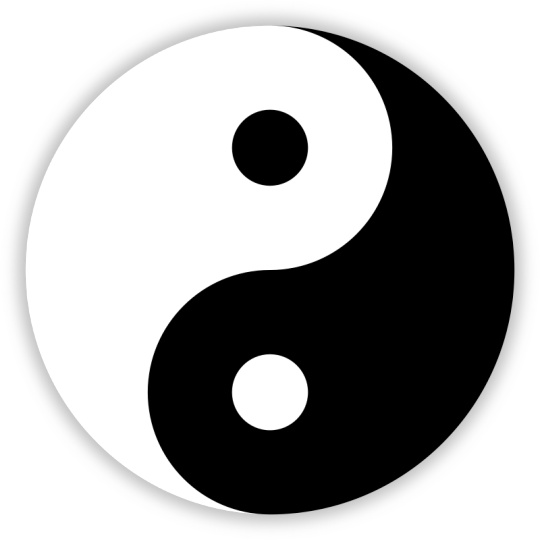
In Taoism, distinctions between good and bad, along with other dichotomous moral judgments, are perceptual, not real; so, the duality of yin and yang is an indivisible whole.
The serpent then can be seen as a representation of the eternal truth of reality, that all is one.
Truth telling is the purpose of the serpent in mythology and this is universally true across mythologies from different parts of the world.
This also seems to be innately tied to the nature of Mrigashira natives who speak their truth or make sacrifices to expose the truth. A simpler manifestation is how blunt and straightforward these natives can be.
Edward Snowden- Mrigashira Stellium in 1h (Sun, Mars & Rahu)
In 2013, Snowden revealed evidence of a shocking global surveillance programme run by the USA’s National Security Agency (NSA) and the UK’s Government Communications Headquarters (GCHQ) which have been monitoring the internet and phone activity of hundreds of millions of people across the world.
The Internet itself was allowed to spread at a magnanimous pace and reach people all over the globe because it serves the interests of people in positions of power by allowing them to track and monitor us, inundate us into a permanent state of distraction with ads and useless content, that fill the pockets of the already rich. It wasn't some lucky happenstance incident, the internet exists for a very malicious reason and if you read about reports from the 90s when the internet was still at a nascent stage you would know that many people called out this bs. In an occult sense, the internet is an all-pervading manifestation of Maya or illusion. It wraps itself into our reality and there's no escaping it, it becomes harder and harder to see the truth and most people are so completely immersed in this illusion, believing it to be real.
Like the serpent that lured Eve out of paradise, a Mrigashira native, Snowden became the harbinger of an era where we now know that companies including Facebook, Google and Microsoft were forced to hand over customer data under secret orders from the NSA. And that the NSA recorded, stored and analysed ‘metadata’ relating to every single telephone call and text message transmitted in Mexico, Kenya and the Philippines.
Several major companies including Apple, Google and WhatsApp have improved the default security and encryption provided to users. Greater consumer pressure has pushed the industry to strengthen its approach to protecting users’ privacy.
We know how algorithms work, we know that our user data is being tracked, we know why we see targeted ads. We know that most content out there is an ad in disguise. Still, we have no real choice in the matter (except maybe clicking the "reject all cookies" button lol), we're forced to stay in a state where despite knowing that something is deeply wrong with society we still have to participate in it. This is Rohini, who had to stay with her father Brahma in the celestial heavens even though he made incestual advances towards her.
In Mrigashira, the truth dawns on you and you have no choice but to act. The reason Rohini ruled by the Moon is connected to manipulation is because these natives cannot exit their unideal situations safely, they are forced to stay and to survive, they must manipulate their reality. Their freedom is curbed. Even if irl, there are no restraints, these natives feel restrained within, so leaving isn't an option for them, they stay and make things worse to cope or in hopes of changing things.
Mrigashira is Mars ruled and is the first Mars ruled nakshatra. Mars is all about taking action and marching forward. The truth can set you free only if you let it and Mrigashira natives deeply understand this. They are determined to remove themselves from these circumstances and stand in their truth. It may not always be literal but this pattern of setting boundaries, establishing a distance between what is "false" and what is "true" is deeply tied to the nature of Mrigashira.
Snowden sought asylum in Russia where he lives to this day. Being in exile or having to escape your home is also Mrigashira coded simply because the home is a toxic/unsafe/unhealthy place for the Mrigashira native to be. I have talked about it before but Mrigashira is connected to the story of Rapunzel.
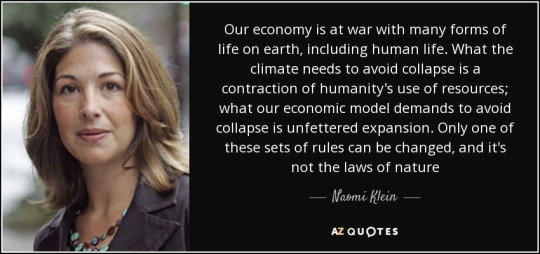
Naomi Klein, Mrigashira Moon is an author, social activist, and filmmaker known for her political analyses; support of ecofeminism, organized labour, and leftism; and criticism of corporate globalization, fascism, ecofascism and capitalism.
Her book No Logo which came out in 1999 is a landmark book that exposes the evils of corporate globalization and franchises and how the Global South are being exploited to fatten the pockets of companies in the Global North. It greatly expanded the growing anti-capitalist consciousness and anti-corporate activism in the decades since. Here's a video where she explains her research. Its chilling to think this was made over 2 decades ago considering how all these things still persist in society and now hurt people more than ever.
Honestly, all her books are amazing exposé work and that's on her Mrigashira Moon.
Louis Pasteur- Mrigashira Moon
He was a French chemist, pharmacist and microbiologist renowned for his discoveries of the principles of vaccination, microbial fermentation, and pasteurization (named after him). His research in chemistry led to remarkable breakthroughs in the understanding of the causes and prevention of diseases, which laid down the foundations of hygiene, public health and much of modern medicine. Pasteur's works are credited with saving millions of lives through the development of vaccines for rabies and anthrax.
He was a very controversial figure in his lifetime who was known for deceiving people.
This article explains it well. Here's an excerpt from the article:
"His most famous experiment was on a young boy, Joseph Meister, who had been bitten by a rabid dog and was doomed to death, and whose mother pleaded with Pasteur to treat him. Pasteur reported that he had previously used his rabies vaccine on 50 dogs without a single failure.
Again, the laboratory notebooks show that this account was misleading. Pasteur had tested a vaccine on dogs, but it was prepared by a completely different method than the one he used for the vaccine given to Meister, and he had no conclusive animal results to show that the vaccine worked. But he had guessed right."
Pasteur often lied to get his way and used "deception" to advance his practice. It is ethically questionable for sure but the work he did has helped millions of people and one could say it was all for the greater good.
He disproved the then prevailing notion of spontaneous generation (it was believed that any exposure to air anywhere causes the generation of living organisms) through his experiments and was initially disbelieved and ridiculed until his experiments began to be accepted as true and was recognised by the scientific community.
Mrigashira natives often have a tendency to gauge things or call people out on things even when that thing/person is widely accepted. The native may get flak for it and be shunned for it but eventually their ideas become widely accepted and everyone sees the truth. They may or may not get credit for this. They see the truth before others do.
Aldous Huxley- Mrigashira Rising
He was an author and philosopher who is best known for his novel Brave New World although he has written over 50 books. Brave New World (the title itself is very Mrigashira core, don't you think?)
The idea that government control is dehumanizing is the overarching theme. In Brave New World the government controls every aspect of the citizens' lives. They are created and born in a government lab. They are raised in a government facility while learning society's values.
It was published in 1932 and lets just say that the audience wasn't ready for such an alarming dystopian tale.
A notable critic of Brave New World was the author H.G. Wells, whose 1923 novel Men Like Gods (a book about a man who visits a utopian world and then returns to earth) had been an inspiration of sorts to Huxley, who told a friend in 1931 that he was writing a novel about the “the horror of the Wellsian Utopia and a revolt against it.” Wells said, “A writer of the standing of Aldous Huxley has no right to betray the future as he did in that book.”
H.G Wells was known for his utopian visions that permeated nearly all of his published work. Interestingly, he was a Shravana Rising. The thing is, Wells never used these utopian visions to criticize the reality of the world we live in, it was more of a "look how good things could be ughhh". This once again reflects Moon's nature which is idealistic but not practical or rooted in confronting situations as they are, if you ask them for a solution to the war, they'll say "if only everyone could get along and we could all stop killing each other" instead of saying "the power imbalance between nations is alarming, they create crises in other nations, put puppet governments in place, exploit them for their own benefits and when it no longer serves their interests, leaves the people to deal with the mess themselves". The former is a more emotional response but it also comes down to Lunar nature believing things are that simple, that if everybody could get along, then everything would be okay. its basically not a solution but a nice thought. I have made posts in the past about Moon dominance and manipulation but what i had failed to mention is that the reason Moon dominants resort to manipulation is because they lack the ability to think in concrete, tangible, practical terms since Moon is tied to the emotional mind which is incapable of rationality or logic. They have to manipulate because they do not know how to think critically. Being guided by your emotions is not reliable or healthy which is why Moon dominance often results in toxicity and manipulation as they are emotionally reacting to what is said instead of responding with their mind or logic.
Wells himself later said about his novel Men Like Gods, "It did not horrify or frighten, was not much of a success, and by that time, I had tired of talking in playful parables to a world engaged in destroying itself."
Do you notice how passive his tone is? He speaks as though he is not part of this world and that all he can do is merely observe its self-destruction (if not writing "playful parables" to it lol??). He thought his book was a flop because it did not "horrify" or "frighten" people (implying that, thats what sells) when the reality is that its more effective to read about the horrors prevailing our society that we are ignorant of instead of reading 300 pages about a perfect alternate reality where everything is wonderful. one calls to action, another encourages passive daydreaming. This further differentiates the nature of Mrigashira vs Moon dominant natives (Mrigashira follows Rohini's fall from heaven or realising the truth).
"There are things known and there are things unknown, and in between are the doors of perception"- Aldous Huxley, Mrigashira Rising
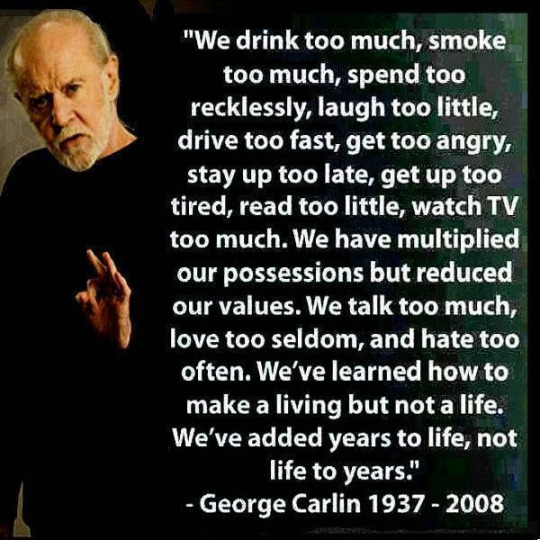
George Carlin, Moon (conjunct Ketu) in Mrigashira
Here's an excerpt of something he said that has stuck with me and exemplifies the truth telling nature of Mrigashira.
"But there’s a reason. There’s a reason. There’s a reason for this, there’s a reason education SUCKS, and it’s the same reason that it will never, ever, ever be fixed. It’s never gonna get any better. Don’t look for it. Be happy with what you got. Because the owners of this country don't want that. I'm talking about the real owners now, the real owners, the big wealthy business interests that control things and make all the important decisions. Forget the politicians. The politicians are put there to give you the idea that you have freedom of choice. You don't. You have no choice. You have owners. They own you. They own everything. They own all the important land. They own and control the corporations. They’ve long since bought and paid for the senate, the congress, the state houses, the city halls, they got the judges in their back pockets and they own all the big media companies so they control just about all of the news and information you get to hear. They got you by the balls. They spend billions of dollars every year lobbying, lobbying, to get what they want. Well, we know what they want. They want more for themselves and less for everybody else, but I'll tell you what they don’t want: They don’t want a population of citizens capable of critical thinking. They don’t want well informed, well educated people capable of critical thinking. They’re not interested in that. That doesn’t help them. Thats against their interests. Thats right.
They don’t want people who are smart enough to sit around a kitchen table to figure out how badly they’re getting fucked by a system that threw them overboard 30 fucking years ago. They don’t want that. You know what they want? They want obedient workers. Obedient workers. People who are just smart enough to run the machines and do the paperwork, and just dumb enough to passively accept all these increasingly shittier jobs with the lower pay, the longer hours, the reduced benefits, the end of overtime and the vanishing pension that disappears the minute you go to collect it, and now they’re coming for your Social Security money. They want your retirement money. They want it back so they can give it to their criminal friends on Wall Street, and you know something? They’ll get it. They’ll get it all from you, sooner or later, 'cause they own this fucking place. It's a big club, and you ain’t in it. You and I are not in the big club.
And by the way, it's the same big club they use to beat you over the head with all day long when they tell you what to believe. All day long beating you over the head in their media telling you what to believe, what to think and what to buy. The table is tilted folks. The game is rigged, and nobody seems to notice, nobody seems to care. Good honest hard-working people -- white collar, blue collar, it doesn’t matter what color shirt you have on -- good honest hard-working people continue -- these are people of modest means -- continue to elect these rich cocksuckers who don’t give a fuck about them. They don’t give a fuck about you. They don’t give a fuck about you. They don't care about you at all -- at all -- at all. And nobody seems to notice, nobody seems to care. That's what the owners count on; the fact that Americans will probably remain willfully ignorant of the big red, white and blue dick that's being jammed up their assholes everyday. Because the owners of this country know the truth: it's called the American Dream, because you have to be asleep to believe it."
Mrigashira natives are the most likely to be critical of society, modern living, capitalism etc among other things. They see through to the truth of things and thus feel dissatisfied and disappointed with the world. There is a reason they say "ignorance is bliss", those whose eyes are veiled, can tune out of all this cacophony of living and pretend everything is fine. Mrigashira natives have to live with the weight of knowing.

Jules Verne- Mrigashira Rising
He is widely regarded as the father of science fiction and his works have inspired a generation of scientists like the pioneering submarine designer Simon Lake, Igor Sikorsky who often quoted Verne and cited his Robur the Conqueror as the inspiration for his invention of the first successful helicopter, the rocketry innovators Konstantin Tsiolkovsky, Robert Goddard, and Hermann Oberth are all known to have taken their inspiration from Verne's From the Earth to the Moon.
Edwin Hubble, the American astronomer, was in his youth fascinated by Verne's novels, especially From the Earth to the Moon and Twenty Thousand Leagues Under the Sea. Their influence was so strong that, like Verne, Hubble gave up the career path in law that his father intended for him, setting off instead to pursue his passion for science.
Jules Verne lived in the 19th century (he passed away in 1905, aged 77) but he described technologies that would later be invented (some were directly inspired by what he had written). He had prophetic vision some would say he had described submarines, helicopters, the moon landing, holograms, newscasts, space travel, video conferencing,
“In the Year 2889, instead of being printed, the Earth Chronicle is every morning spoken to subscribers, who, from interesting conversations with reporters, statesmen and scientists, learn the news of the day,”
He even made political observations that have since materialised,
In one of his later works, called The Purchase of the North Pole, an auction is held for rights to the North Pole. The mysterious buyer who wins out over a number of national governments is a private company with a plan to fire off a giant cannon will jolt the planet and change the tilt of Earth’s axis, adjust the length of the days and climates around the earth, and melt the polar ice caps. With the Arctic melted, the execs planned to mine the north pole for coal and make a fortune. This is more or less what is currently happening lol
He invented a new genre to talk about things that did not yet exist. This is tied to Mrigashira's quest for truth and imagining possibilities.
Kanye West, Mrigashira Sun
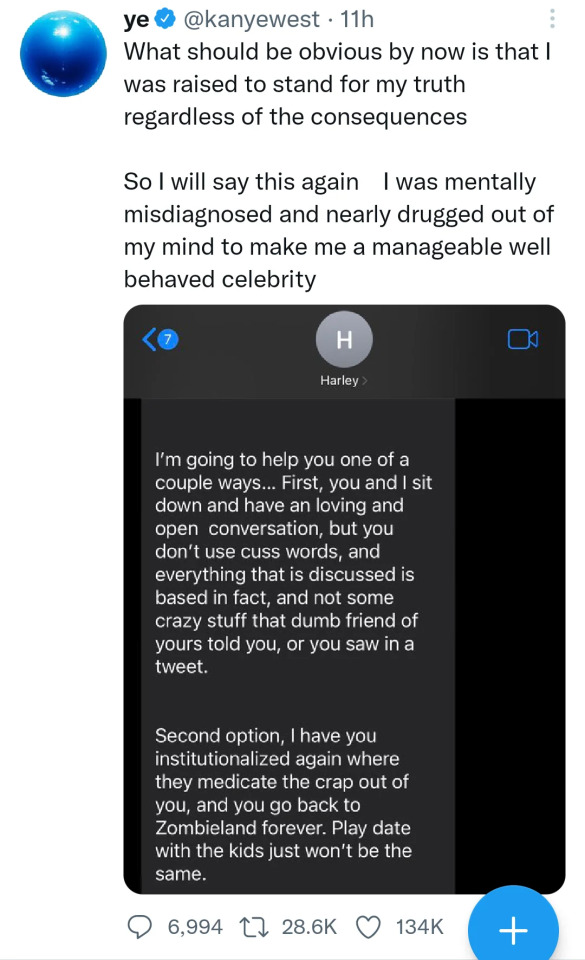
Do I think Kanye is problematic? Extremely. Do I think he's also telling the truth on some occasions especially when he's trying to expose Hollywood or the system? Yes, I do
This is a bit of a tangent but we have seen time and time again how mental illness has been weaponized against people (ex: Britney Spears) to control them (Mariah Carey also speaks about it in her memoir), I do think a great number of celebrities are victims of this because their management/people in their lives benefit from exploiting them (would it not be vvv scary knowing that your career is what pays the bills of a whole crew of people? they depend on you to live? what if they're greedy or evil? what happens to you then?) so I wholeheartedly believe Kanye when he says "people are trying to conspire against him for telling the truth" (look at how many whistleblowers have been killed and had their deaths written off as suicides).
Sometimes I wonder if he's deliberately ruining his public image so that he just comes across as a crazy guy saying crazy shit that no one takes seriously. This is a safe option for him because if he appeared to be a normal sober serious guy exposing the system he might get killed. Deception is also a huge part of Mrigashira's truth telling.
Who can forget him exposing Taylor on that phone call? lol
Anyway, I want to make it clear that I don't condone or endorse any of Kanye's politics or most of the vile hateful garbage he spews.
youtube
Amy Winehouse-Mrigashira Rising
Amy was known for how candid and straightforward she was. If you listen to this song, you can tell how frank and honest the lyrics are?? (its about women who try to score rich men). Amy was always so real and unapologetically herself.
youtube
Pamela Anderson, Mrigashira Rising
She's such an icon and such a dignified woman after everything she's been through. She came forward to speak her truth and take control of her narrative. Unfortunately not many women in her position can or will do this. She empowers sooo many others by standing up for herself and speaking her truth.
youtube
Mia Khalifa, Ketu in Mrigashira (a lot of people ask me why I include placements other than the big 3 and the reason I use Ketu specifically is because it is a karmic planet and Ketu's position in the birth chart is thought to indicate ties to previous lifetimes. It represents life experiences and knowledge that people may carry from past incarnations. Yes, I am aware that Ketu is a generational planet and people born across the same year have the same Ketu placement but the reason why Ketu placement is significant especially in the charts of accomplished people is because they are channelling the collective unconscious and I believe that in order to receive recognition for the work you do, you have to skilfully channel your Ketu as it represents your latent creativity and potential that connects you to the whole)
whew went off on a tangent 🤪(me with everything i post lmao)
Mia Khalifa has come forward exposing the porn industry and calling out its predatory nature and has candidly spoken about how she was "intimidated" into doing her infamous hijab scene and that her toxic ex husband encouraged her to pursue porn. I hope Mia heals from everything but she's sooo brave for calling out people/society/porn industry on their toxicity, misogyny, double standards when the same men who fap to her porn are the ones calling her a whore (she made a mistake when she was 20 and has been out of the business for 10 years at this point, at what point will we let her move on with her life and shed this image for good?)
youtube
Nicole Kidman- Mrigashira Sun
who can forget this iconic interview when Nicole exposed the truth behind her meeting with Jimmy lol, he was so sh00k
She starred in the 2003 movie Dogville where she plays the daughter of a mob boss who runs away because she cannot stand the stuff they do (running away because they can't accept the circumstance they are in is a prominent Mrigashira theme). Its an arthouse film about the nature of evil and it shows how after Nicole's character has run away to Dogville, she has to provide labor for the community in order to be allowed to stay (Mrigashira natives making a "sacrifice") and ultimately towards the end after enduring a lot of abuse, Nicole's character destroys the whole place.
youtube
Jim Carrey- Mrigashira Moon
He is hella problematic for sure but he has this existential side to him where he is always dropping truthbombs. Remember this iconic video where he says NYFW is meaningless lmfao
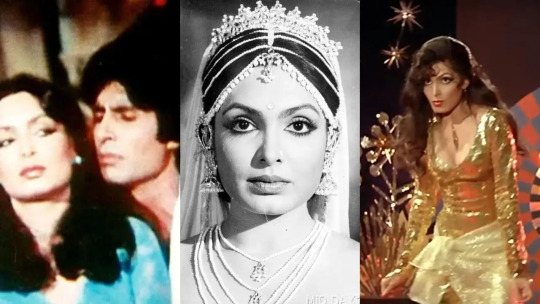
Parveen Babi, Mrigashira Moon
Parveen Babi was a Bollywood superstar in the 70s and 80s. In 1977, she started dating the filmmaker Mahesh Bhatt (he has a reputation for being vile, crass asshole) and he insisted that she go to a psychiatrist following which she was diagnosed with paranoid schizophrenia. I cannot comment on whether or not Miss Babi was misdiagnosed but what is apparent is that her relationship with Bhatt took a severe toll on her mental health, there are tons of people who've said he's kind of a psychopath, so I don't doubt that he may have gaslit and abused Babi to a point where she may have lost her sanity. For the rest of her career she struggled with episodes of debilitating paranoia, delusion and violent aggression. She once even blamed Amitabh Bachchan (the biggest star in India) for being her biggest adversary and claimed that he was trying to kill her (I know this sounds delusional but we do not know what kind of relationship they had with each other or what might have led her to believe that she was in potential danger, its cruel to dismiss everything someone says as "oh but she's mentally ill").
Babi quit acting and was a recluse in her later years. She died alone in her apartment when she was 51 and her body was only found 3 days later. Mahesh Bhatt helped organise her funereal when nobody else stepped forward to even claim her body at the hospital. Her life is a tragedy and a cautionary tale.
Mrigashiras are doubtful of absolutely everything. They do not trust people easy AT ALL. They question absolutely everybody's motive and whilst this can create thought provoking and interesting art and make a person inquisitive, honest etc, it can also be exhausting and draining to constantly be on guard and watch your own back.
“Slowly, one by one, I lost trust in everybody and everything around me,” Babi wrote. “Have you ever wondered what it is like to function in life, distrusting everything and everybody? We trust most of the things and people around us without questioning. We trust the food we eat, the water we drink, the air we breathe...It is impossible to function in life without trusting. And that is precisely what happened to me.”- Parveen Babi
Mrigashira natives are prone to paranoia and feeling unsafe (this ties back to their mythology) and I truly feel for them :(((
Oppenheimer- Mrigashira Rising
Oppenheimer’s infamous meeting with Truman took place in October 1945. It did not go well: Oppenheimer failed to convince the president of the need for international control of atomic energy, while Truman confidently stated the Soviets would never get the bomb. Getting nowhere, Oppenheimer really did confess his guilt over the Manhattan Project, which turned Truman’s stomach.
Oppenheimer's morality is dubious and questionable etc etc but it is known and clear that he felt guilty for the role he played and the destruction that was caused as a direct result of his research. He stood up for what was true, although unsuccessfully.

Khloe Kardashian-Mrigashira Moon
Khloe has always been praised for being "real" and honest. She has opened up about a lot of different things and had this to say about having a baby via surrogacy:
“But a surrogate process – Kim knows – is very hard for me. It’s a mindf***. It is really the weirdest thing,” she bravely shares about her nine-month-old cherub, Tatum. “I do feel less connected. People do say it takes a minute to feel connected but Kim said hers was easy. This is not easy. I definitely was in a state of shock from my entire experience in general,” she said. “I felt really guilty that this woman just had my baby and I take the baby and go to another room and you are separated. It felt like such a transactional experience because it is not about him. I wish someone was honest about surrogacy and the difference of it. But it doesn’t mean it is bad or good. It is just very different.”
Compared to the kind of stuff that all the other Kardash-Jenners say this is a rare and sincere moment of truth telling.
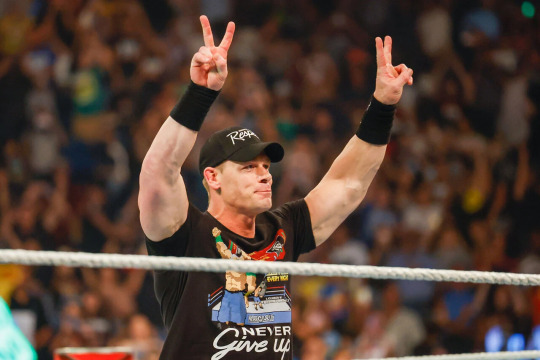
John Cena Mrigashira Moon and Rising
He is known for his honest, humble and sincere personality.
In an interview about the Meltzer rating system, Cena honestly said:
“So how do I put this… I am much more concerned when I perform for WWE in how the audience as a whole feels about my performance rather than one individual trying to grade me in a level of stars. Not that it doesn’t matter, because that is a great way for those to try and get equity and try to get noticed. It’s a great ranking system and I do appreciate it. I’m not knocking critics. I’m just saying my process is to make sure that everyone who paid a ticket had a great night. And if that gets me a zero star match, I still know in my heart of hearts that I entertained my audience that night.”
if you type in John Cena honesty into google so many articles pop up lol, i guess thats a great thing to be known for. Zero bullshit that's Mrigashira for you
I hope this post was interesting and informativexx
thanks for reading<3
#astrology notes#astrology observations#sidereal astrology#vedic astro notes#nakshatras#astrology#vedic astrology#astro observations#astroblr#astro notes#jyotish#mrigashira#mars
294 notes
·
View notes
Text
The Polynon: A Geometry of Consciousness
How Consciousness is a fundamental substance and everything else, including the Observer, is it's function of self-reflection within a complex construct and hologram.
Introducing the polynon:
A polynon is a conceptual geometric entity, a polytope of which vertices are non-events and its edges, holograms. A polynon contains all the holograms of that which can be projected as a polytope. From tetranon to dodecanon, and special cases such as dinon and nullanon.
The epistemological foundation of the polynon is a non-event, hence multi (poly) non-events. The ontological foundation is a noumenon, both in its negative and its positive aspect.
Collapsing the noumenal realm into a single dimension results in the conceptual noumenal monad, where the perceptual border is equal to the infinity of noumenal possibilities, as well as the phenomenal something.

Or, as "a cercle with the centre everywhere and circumference nowhere". A monadic embodiment of the thing and the non-thing, the visual expression of the substance of consciousness.
The neutral monistic approach enfolds the ancient knowledge of the self, and the contemporary science of consciousness, from a Vedantic self reflected in Indra's net, to a multi-dimensional implicate and explicate construct of Bohmian orders.
Also encapsulated in the formulation f(f)=f, akin to an Ouroboros mathematical formulation symbolizing a form of autopoiesis or self-production ad infinitum, a self-referential Fichtean process where the self (I) is both the creator and subject of its reality.
The eternal aspect of consciousness, a timeless monadic essence, is described as the perceptual continuum of f=0, signifying pure, timeless potential.
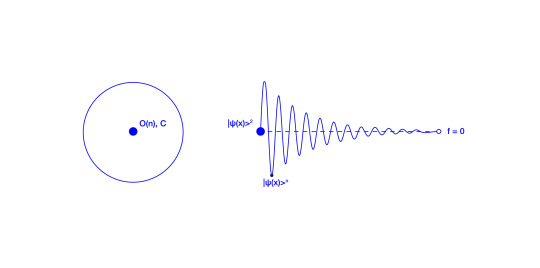
"Eternity isn’t some later time. Eternity isn’t even a long time. Eternity has nothing to do with time. Eternity is that dimension of here and now that all thinking in temporal terms cuts off." - J. Campbell
The wavefunction is defined here as a layer of the noumenal monad, a transition between epistemological and ontological, given by the limits of the Observer's senses and perception.
In this context, |ψ(x)>*n, with n not strictly equal to 2, transcends its conventional mathematical role within Hilbert space and diverges from standard quantum mechanics, suggesting that different values of n represent distinct dimensions or layers of noumenal collapse.
Each wavefunction is a layer of the noumenal lens, of which border is (n+), or consciousness C; it’s contents are negative noumena (n-) and it’s holographic centre “collapsed” onto a phenomenal Observer O(n) as function of noumenal self-reflection of consciousness.
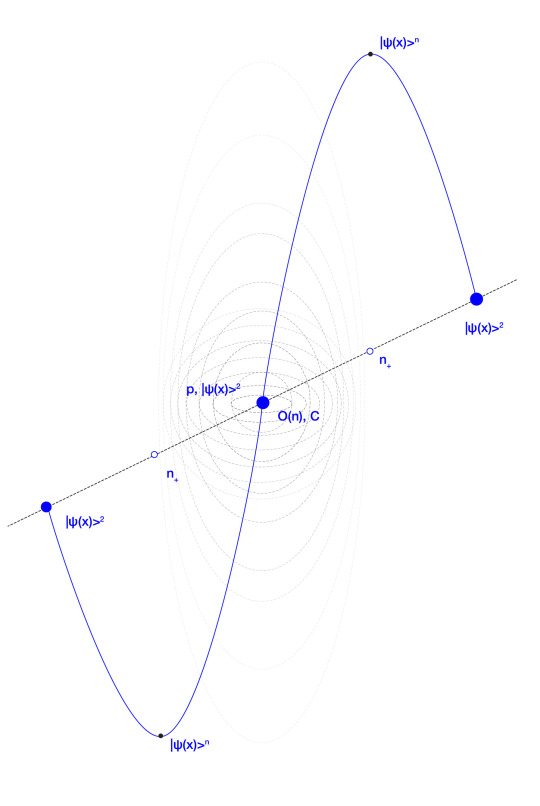
Furthermore, the Observer is envisioned as a holographic projection sitting at the core of the noumenal lens, emerging from the focus and diffraction of noumenal probabilities within the noumenal lens.
The perceptual border of positive noumena (n+) reflects and focuses noumenal probabilities (n-) into the hologram of the Observer O(n).

A rotation of noumenal lens reveals the noumenal essence (n+), hidden under the superposition of the noumenal lenses (n-) and the hologram of the Observer O(n).
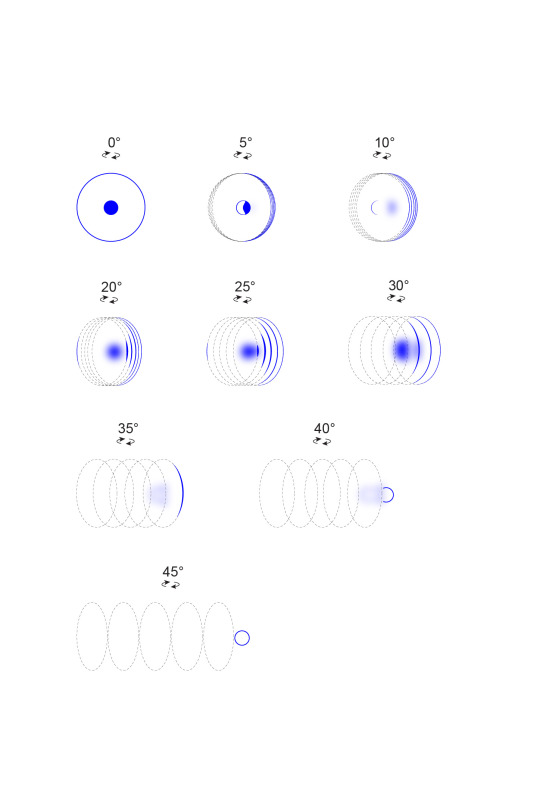
The observer’s perceptual focus, directed through Cognitive Gravity G and visualized with noumenal g(n) and cognitive gradients g(r), refracts the essence of Consciousness, transforming noumenal vertices into discernible edges like light through a prism.
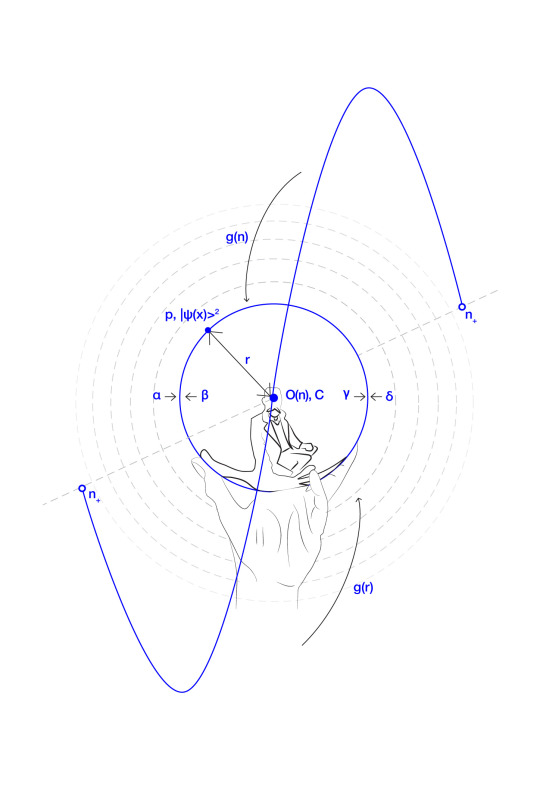
As the number of noumenal collapses increases, the complexity and breadth of the observer’s perceptual dimension diminishes, resulting in a progressive refinement and narrowing of perceptual prowess of the observable construct.
A cognitive threshold marks the evolution from a purely phenomenal observer to one with phantasiai and developed cognitive functions. This threshold varies according to the local conditions of the observer’s cognitive gradient and gravity and the overall noumenal function.
The hologram of a polynon enfolds within it the reflection of the noumenal substance, that both originates and reflects consciousness. It encapsulates the entirety of consciousness in each of its vertices and edges, as projections into a perceptual reality.
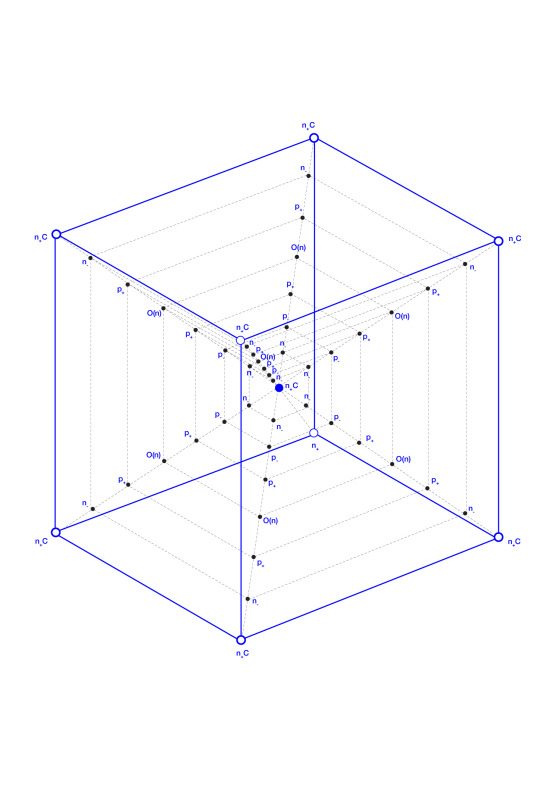
The concept of “consciousness nodes” describes (n+) zones between noumenal lenses (n−), revealed as vertices of the polynon, equal and identical in nature.
The Observer O(n) is in superposition with the phenomenal p+, epiphenomenal or phantasiai p-, negative noumena n- and noumenal vertices (and centre) n+ of the hexanon as a function for self-reflection of consciousness C.
The polynon is abstract and elusive, residing beyond human imagination yet within its grasp. No heavier than a fleeting idea, but far too heavy to be understood. A palindrome for language and thought, mirroring itself in perpetual paradox. Beginning the same way it ends.

From the "Polynon: A geometry of Consciousness", by Tib Roibu Read the paper here.
45 notes
·
View notes
Text
Vedic Astrology Observations
Moon Dominant Men: “Deep and Mysterious”
🌖🌗🌘🌑🌒🌓🌔

(GIF context: Taken from Shadowhunters depicting a gay couple with Matt Daddario (left) who is Moon Dominant [Hasta sun and ketu with ketu as moon nakshatra ruler] and Harry Shum Jr. (right) who is Rahu Dominant [Ardra moon and Swati Jupiter with Sun in Jupiter ruled nakshatra]. Both actors identify as straight.)
In Vedic astrology, the Moon, or “Chandra”, occupies a position of profound significance. It is coveted as the very embodiment of the mind, a symbol resonant with clarity, reflection, instincts, and cycles, which when combined come to form what we know as perceptual consciousness. Like the Moon, which shines by reflecting the Sun's light, the mind similarly reflects its environment. It captures and reinterprets external stimuli, forming a consciousness that is, in essence, an image similar to that of a mirror of the surrounding world. In Vedic astrology, the Moon is a celestial body that stands as the fundamental indicator of one’s capacity for emotion and extends to one’s ability of cogitation, shaping the manner in which thoughts and emotions are processed and articulated. In contrast to Western philosophical perspectives, which tend to dichotomize emotions and logic, framing them as diametric to one another, Vedic astrology presents the Moon as a mediator that brings the two faculties together through upholding the position that our cognitive and decision-making processes are inextricably linked with emotional undercurrents. It echoes a sentiment that, even in endeavors that ostensibly try to prioritize objectivity, such as with epistemological pursuits, true objective knowledge is nothing but an elusive ideal. This stems from the notion that our perception forms our reality, encapsulated in the phrase, “I am my universe.” This is where the significance of the Moon in Vedic astrology becomes particularly relevant. It posits the idea that our subconscious greatly influences our conscious mind, thereby molding our individual perceptions of reality and shaping the way we experience the world. It recognizes the limitations in our control over our mental faculties and how emotions actively play a part in deciding our thoughts and life trajectories, whether we like it or not. This allows the symbolism of the Moon in Vedic astrology to effectively capture the human condition's amalgamation of thought and feeling, thereby speaking to the interaction of light and shadow in the psyche and the ongoing process of mental transformation.
Men with a pronounced lunar influence in their astrological charts, notably distinguished by those with primary placements (Sun, Moon, or Ascendant) in or aspects with Moon-ruled nakshatras such as Rohini, Hasta, and Shravana (planetary dominance can be determined in more subtle ways as well), present an intriguing study into the nuanced expressions of masculinity and relational dynamics. Examples of Public figures like Henry Cavill, with his Shravana Ascendant and Moon in the first house, or fictional characters like Flynn Ryder, voiced by an actor with a Hasta Sun and Rohini Moon, exemplify a unique blend of characteristics associated with lunar dominance that I will continue to explore further.
(GIF and image contexts: The first GIF shown depicts Henry Cavill as Clark Kent in Man of Steel. The second is an image showing the fictional character Flynn Ryder side by side with his voice actor Zachary Levi.)
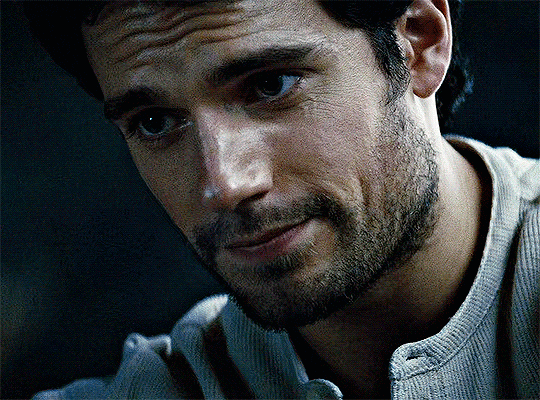
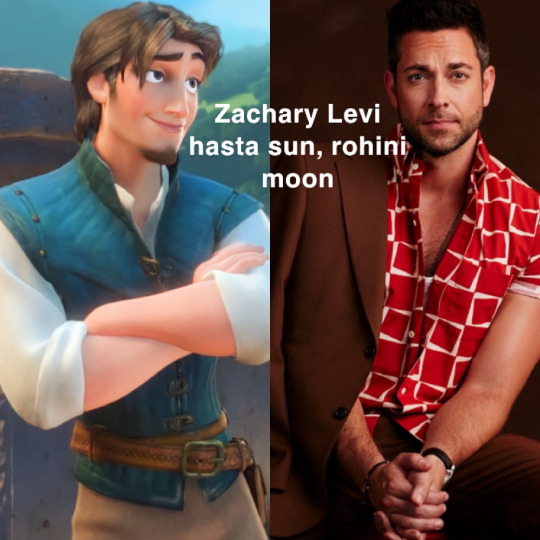
The influence of the Moon on men can be understood through the influence of the mother and the lens of "Yin and Yang" in Eastern philosophy. In Vedic astrology, the Moon's connection with the mother can be said to link the development and characteristics of individuals to the amount of nurture and emotional sustenance they were provided with as a child. This nurturing shapes the robusticity of their intrinsic Yin qualities – receptivity, passivity, intuition, and a deep connection with the maternal aspects of life, often linked to the feminine. These qualities are further symbolized by the Moon and its cycles, traditionally associated with menstruation, highlighting the cyclical and nurturing features of femininity. In contrast, Yang represents the dynamic, assertive, and outward energy projection, typically linked to the masculine and more solar sattvic energies. Men with Moon-dominance in their astrological profiles embody this Yin energy, exemplifying a reflective masculinity and an inward understanding of femininity. This inward orientation of Yin, shaped significantly by the emotional and nurturing bond with mother figures, provides these men with a deeper understanding and connection to various feminine aspects of life. At the same time, the outward orientation of Yang allows for an external connection to the masculine, producing a self-identified masculinity that is introspective and emotionally/mentally attuned to the feminine while still being confident in its own nature. This ultimately does have a dampening effect on their exhibition of traditionally masculine behaviors, being that men as a whole are ruled by the Sun and are said to be more solar, while women as a whole are ruled by the Moon and are said to be more lunar. (The 24-hour circadian rhythm is based on the male hormone cycle and aligns with the Earth's orbit relative to the sun, while women have what is known as an infradian rhythm, which follows the 28-day lunar cycle, for reference). This internal emphasis on Yin but external reflection of Yang in Moon-dominant men's personalities makes them emotionally rich and empathetic, displaying a unique blend of masculine and feminine energies that is both introspective and in harmony with the external world. The Moon serves to harmonize the intense energy of the Sun, offering calming and nurturing attributes, ultimately leading to the formation of a kind of masculinity in these men that is fluid and can express strength in gentleness and assertiveness in sensitivity. However, this can also make them uniquely susceptible to certain challenges, which I will continue to discuss further in the following paragraphs.
The Moon is also tied with its nodes: Rahu and Ketu, the two mathematical points where the Moon's orbit meets the ecliptic (if you didn’t know, the Moon does not directly follow the ecliptic itself, which is the sun's path in the sky; it’s about 5° off approaching either node). The Moon's astrological significance is intricately linked to Rahu and Ketu, with all three governing distinct facets of consciousness. Rahu, often depicted as the head of a dragon or the head without a body, symbolizes material desires and is associated with the future, representing the qualities we need to develop and the experiences we must have to grow. Rahu is primarily concerned with the rational mind and the projection of consciousness into the material realm, epitomizing ambition, desire, and worldly aspirations. It represents the part of the psyche that is outwardly focused, engaging with the tangible aspects of life that are said to paradoxically represent the illusion of Maya. Conversely, Ketu, commonly depicted as the dragon’s tail or a headless body, represents detachment, spirituality, and the internal journey. It is associated with the past and karmic baggage, indicating the lessons we have learned and the experiences we must release to evolve through Samsara to achieve Moksha. Ketu is about letting go and achieving spiritual enlightenment. It is associated with intense spirituality, introspection, and the aspects of the psyche that delve into the depths of the subconscious and the ineffable. Ketu represents the part of the mind that seeks to understand and connect with the intangible, the mystical, and the existential. (In Vedic mythology, Rahu and Ketu are said to be the same demon killed by Vishnu)
The Moon acts as a mediating conduit between these two nodes, attempting to balance the rational, materialistic impulses of Rahu with the spiritual, introspective tendencies of Ketu. It symbolizes the emotional and perceptual aspects of consciousness, playing a supreme role in how feelings and intuition are integrated with rational thought and spiritual insight. The Moon's position in a chart thus reflects the ongoing dance between the material and spiritual dimensions of human existence, influencing how individuals perceive and interact with the world around them. And because the moon works with the energy of both nodes, we can gain knowledge into the expression of Moon-dominant individuals by looking at aspects of Rahu-dominant and Ketu-dominant natives.
Rahu-dominant men often exhibit a desire for control, particularly in their mental environments. Their creativity often manifests in unique, sometimes eccentric ways, setting them apart in their expression and thought processes. These individuals typically lean towards liberal ideologies, embracing progressive and forward-thinking concepts but is often against society as a whole. Rahu-dominant men are often driven by ambition and a desire to achieve success and recognition. They are inclined to be more outwardly assertive in their quest for control, sometimes pursuing their goals with a relentless, almost aggressive, determination. This pursuit often leads them to challenge established norms and push boundaries, both socially and professionally. And while Moon-dominant men share traits with Rahu-dominant men, they exhibit distinct differences in how these characteristics are expressed and integrated into their personalities. Moon-dominant men tend to internalize their need for control, focusing more on emotional and psychological self-mastery. They are more concerned with understanding and regulating emotions rather than exerting control over external circumstances for the sake of gaining power, and they are more satiated with what they have rather than desiring what they don't, making them less materially-orirented than Rahu. Rahu men often have an obsession with external appearances and how others perceive them, trying to enforce their own rules or standards on others in order to gain the upper hand, but Moon men just want to maintain their own sense of security. They may still try to subtly reshape situations though, not to become the dominant power, but as a means to maintain their personal well-being, even at times to the detriment to others. Additionally, their approach to creativity is more reflective and introspective than what you might expect to see from Rahu, often drawing from deep emotional reservoirs and personal memories. Moon-dominant men may too challenge conventional thinking like Rahu dominant men, but their methods are typically more subtle and under the radar. For example, if a Moon-dominant man wants to avoid an arranged marriage, he might subtly express concerns or sadness about the marriage in a manner that is meant to gently persuade his family to rethink their decision. Simultaneously, he might engage in covert actions to disrupt the arrangement, such as discreetly creating scheduling conflicts and other minor obstacles that prevent it from happening efficiently as if to send unconscious signals that it was not "meant to be." In more extreme instances, he may feign agreement, choosing instead to engage in extramarital affairs, all while maintaining a cloak of compliance to avoid direct confrontation. This is in stark contrast to a Rahu man who will openly question and criticize the tradition, speaking out against his family to say it is stupid, and he may even actively rebel against it by running away to marry someone else.
(Add-on: both Rahu and Moon men possess an acute awareness of the perils of straying too far from rationality and thus are inclined to maintain a strong connection with external reality. They may encounter challenges when they engage too much with the immaterial, like dreaming, drugs, alcohol, gambling, etc., leading to their connection with external reality becoming tenuous. This disconnection can lead to issues such as escapism, addiction, and emotional disturbances, so be wary and try not to get to the point of obsession where you lose sight of your life.)
Conversely, Ketu-dominant men often possess a deep internal focus and an inclination towards introspection. Ketu-dominant men are often characterized by their profound spiritual orientation and a tendency towards seeking inner peace and enlightenment. They may exhibit a strong interest in the metaphysical or the mystical, delving into areas that transcend the material world. This spiritual pursuit often leads them to detach from worldly ambitions and superficial desires, making them appear aloof or disinterested in material success, paradoxically leading them to attract immense power. They tend to absorb energy from their surroundings, revealing truths in impactful ways and arousing servitude in others due to their stilled, void-like nature that makes people want to give to these men tirelessly. Ketu-dominant men might display a more pronounced detachment from their emotions. While they are capable of deep feeling, they often approach their emotions from a place of observation and analysis, rather than immersion. This detachment can sometimes be misinterpreted as coldness or indifference, but it is more accurately a sign of their deep internal processing and preference for solitude. Moon-dominant men, while sharing certain introspective and internal qualities with Ketu-dominant individuals, exhibit these traits in distinctly different ways, shaped by the unique lunar influence. while Moon-dominant individuals also exhibit introspection and depth, their focus is more on the emotional and psychological features. They are keenly attuned to the nuances of their own emotions as well as those of others, and this emotional sensitivity often translates into a strong sense of empathy and an intuitive understanding of human nature. Unlike the Ketu-dominant detachment, Moon-dominant men are more engaged with their immediate environment, forming deep emotional connections and valuing interpersonal relationships more than Ketu men (note that this also depends on the placement of moon in the chart as a whole, like 12 house Moon in Jyeshtha will be more Ketu-like for example). Moreover, Moon-dominant individuals may exhibit a fluctuating nature, akin to the waxing and waning phases of the Moon. They can be adaptable and receptive, often reflecting the energies around them, which can lead to a rich, albeit sometimes confusing, emotional life. This contrasts with the more consistent, inward-focused nature of Ketu-dominant men, who may remain unfazed by external circumstances, steadfast in their introspective approach for better or worse. People are drawn to both Moon and Ketu dominant men due to their compelling allure of hiddenness, but unlike the Ketu man that will remain still and almost hollow, absorbing all of the energy and power they come in contact with through their tamasic nature, Moon men will reflect energy back. This reflection of energy, softer and more reciprocal, differentiates Moon-dominant men from their Ketu-dominant counterparts, in the way that it doesn’t illicit as much discomfort in others. What usually happens with Ketu men is that others sense their inherent “emptiness,” which causes them dis-ease to the point where they will shower these men with energy in hopes that doing so will change the Ketu man or stabilize him. But Ketu men don’t work like that; their purpose is to take and consume, so no matter how much energy people give them, it is never going to be enough to make that penetrating uneasiness they give off go away. This isn’t a bad thing though. In fact, it is beneficial to the energies whose purpose it is to give, like Jupiter. It just comes down to the role people are meant to serve in this life. The differences between Moon and Ketu men highlight the unique ways in which they connect with and respond to the world around them as it relates to their Dharma.
Connecting Rahu and Ketu, because of the Moon’s relationship with both of these astrological energies, Moon-dominant natives will not only resonate with the powerful spiritual and subconscious layers of Ketu, but also to the more tangible, worldly, and reasoned aspirations represented by Rahu. This connection with Rahu and Ketu instills Moon-dominant men with a magnetic charm, characteristic of Ketu men, that is less domineering and still grounded in the more rational world of Rahu, making their allure more accessible and relatable to others. Unlike the piercing, sometimes overwhelming and obsessive depth of Ketu and the overbearing frigidity and judgments associated with Rahu, the Moon's influence results in more of a balanced persuasive appeal, empowering them with an immensely vitalizing aura. Overall, while there is a resemblance between the effects of Rahu/Ketu and the Moon, the way they manifest and are perceived is distinct. I think it bears mentioning that since the Moon deals with the energies of both, its natives are also susceptible to accompanying pitfalls for either. Because despite their inter-relation, the Moon’s integration of these energies can be messy. Rahu and Ketu are the extremes, which can end up eclipsing the Moon and/or the Sun, “swallowing” their energies (light) to try and destroy them. This solidifies the nodes’ place as natural adversaries of the luminaries.
(Add-on: There’s a balance that must be struck when dealing with these energies, and sometimes they can just be too difficult to manage, leading to things like insanity. While the Moon, Rahu, and Ketu are similar, it is important to remember the differences, with the main takeaway being to exercise awareness and moderation, as these energies can be seriously harmful when experienced in excess. Intriguingly, individuals under the influence of the Moon, Rahu, or Ketu bodies often show the most fascination with understanding psychology, perhaps drawn to explore the very forces that make them uniquely susceptible to emotional and mental turbulence. And oh… isn’t that poetic?)
Alright, now let’s get into the juice of things. As alluded to before, men whose astrological charts are heavily influenced by the moon have the ability to understand emotions and empathize deeply with the feelings of those around them, allowing them to form powerful connections within their relationships. Their insight into the human mind and “heart,” much like the Moon's light that gently illuminates the night, shines on the more hidden aspects of those they interact with. They are known for their exceptional depth of emotional acuity as well as having an intuitive grasp of mental states, including their own. This is typically not overt, however, since there is a concealed nature to the Moon, being traditionally associated with obscurity and subtle aspects of the human psyche. In addition to this, since men perceived as being outwardly feminine have historically been subjects of abuse and harsh treatment from society, Moon-dominant men are more inclined to sheath the less hardened parts of themselves for fear of social scorn. This is important to keep in mind, since Shravana is the most refined and mature expression of the Moon.
Symbolized by an ear, this nakshatra signifies listening, learning, and connection. It is associated with the acquisition of knowledge and the understanding of the world. Men influenced by Shravana may possess a strong inclination towards gathering information, being attentive listeners, and showing a deep interest in the narratives and experiences of others. This attentive and perceptive nature is a personification of the Moon's influence, producing qualities like empathy and understanding, which can be seen as more feminine in nature. Being in Capricorn (the natural ruler of house ten: career and reputation), it is also deeply entwined with themes of reputation and public perception in addition to control. This comes into focus when we consider how Vishnu, the Deity ruling over Shravana for men, is the preserver, suggesting a proclivity of these men to maintain their public reputations and personas through discipline (Saturn deals with control and discipline and is the ruler of Capricorn, for reference). Interestingly, I’ve noticed that Rohini and Hasta men tend to be more openly receptive than Shravana. Hasta is a nakshatra that is linked with dexterity and skill, symbolized by a hand, and more specifically with the ability to manifest one’s desires into the hand. The influence of its ruling deity Savitar, an incarnation of the Sun (contradictory, I know), gives Hasta characteristics of vigor, intelligence, and the ability to dispel ignorance. However, this solar influence is juxtaposed with the Moon's governance over Hasta, which brings in a more calculative desire for energy exchange through things like conversations, meetings, sex, negotiations, fighting, etc., which is not carried out in quite the same way as Sun-dominant men, being that the Moon introduces a more emotionally intelligent approach to these interactions. While the Sun's influence might drive a person towards externally focused actions where they expend energy carelessly, the Moon's guidance in Hasta gives a deeper sensitivity and awareness in their engagements. This means that their approach to energy exchanges, whether in professional settings, personal relationships, or even in conflict, tends to be more reflective and considerate of the emotional context. Men influenced by Hasta may exhibit a strong, vibrant persona, often marked by a commanding yet undeniably soft presence (I’ll reference him again, but the best example of this I could find is Leonardo DiCaprio who is Hasta Moon and Ascendant). Rohini, the first nakshatra under the dominion of the Moon and co-ruled by Venus in Taurus, is emblematic of the chariot, an ancient symbol related with themes of progress, movement, and evolution. This nakshatra's associations with growth, creation, and fertility find their roots in the nurturing energies of the Moon, where it is in exaltation, and the artistic, sensual qualities of Venus. The deity overseeing Rohini, Brahma, is revered as the creator in the Hindu pantheon, further intensifying the nakshatra's intrinsic connection to creativity, nurture, the enjoyment of creation, and the genesis of life. Rohini men often exude natural charm, emphasized by a creative and nurturing disposition. These qualities, resonating with the creative and generative aspects of Brahma, can be seen as more feminine in nature. However, due to societal pressures to adhere to traditional masculine norms, Rohini men might feel compelled to mask these traits. The pressure to conform to traditional masculine norms might lead Rohini men to stifle or conceal these aspects of their personalities, as I've come to acknowledge can be a facet of all Moon men.
The Moon's dominance in a man's chart can influence his expression of gender and identity, modulated by whether he is accepting of his femininity, as observed in public figures like David Bowie (Shravana asc. and Rohini rahu), Prince (Rohini sun and mercury), Troye Sivan (Rohini sun and mercury), etc. These men, embracing their lunar qualities, often work to defy traditional gender norms, adopting androgynous styles that symbolize the fluidity of their gender identity. Their choices in fashion - long, flowing hairstyles, delicate fabrics, and makeup or nail polish - are external manifestations of their inner lunar essence. Some even go as far as dressing up like women! It is not done in a castigating manner where they make fun of the idea as a form of humiliation either; rather, it is more of an attempt to make a full embrace of what it would be like to genuinely exist as a woman, albeit a tad bit over-exaggerated in terms of femininity, but to be fair, that’s the same for Moon-dominant women as well. (This is a bit of a tangent, so skip if you aren't interested. Interestingly I think these men’s personas of women are closer to Ashlesha [in cancer rashi ruled by moon but nakshatra ruler Mercury] than of Moon nakshatra women, possibly being a result of these men having so much pent up female sexuality that yearns to be dominated in much the same way as Ashlesha women, who act outwardly dominant to test the virality of others – beckoning to be overpowered. I noticed this in the new movie Expendables, which stars Jason Statham and Megan Fox (Ashlesha moon). In one scene, they are fighting and Megan Fox comes out on top before again being overpowered, demonstrating that the man is virile enough to "have"/contain/satisfy her. And then she redirects his penetrative energy yet again, which is a common theme of Ashlesha. The "cutesy" fake innocence at the beginning is also something Ashlesha women are known for.)
(GIF context: It shows Troye Sivan dressed in drag for his latest music video and song "One of Your Girls". He is also openly gay and for the time being has not declared he is trans, nonbinary, etc. For fun, you can compare that with this music video with Megan Fox, who is an Ashlesha woman to see what I mean when I compare them: video.)

However, most Moon-dominant men are not as comfortable expressing this duality so openly. Many, in response to societal pressures that valorize hyper-masculine traits and often stigmatize femininity in men, adopt a façade of heightened contentment, stoicism, and control. This outward show, mirroring the characteristics of Sun and Saturn-dominant men, is an attempt to conceal their innate Yin nature. Yet, akin to the Moon which only reflects the Sun's light in a softer, cooler manner, their portrayal of hyper-masculine traits is not pure or without cracks. People can still very much pick up on their the fact that they are simply reflecting masculinity while still internally housing receptive feminine energies, since they reveal themselves in small but noticeable ways that make them stand out from other men. They usually carry with them an undercurrent of mystery, farce, and a general tendency to be overly, and dare I say even comically, brutish, while their emotionally expressive nature still peeks through. This divergence from the archetype they emulate within imparts an illusory, intriguing energy to their persona, attracting some while aggravating others who are less willing to accept the illusion. The struggle to mask their true nature often leads to complex interpretations of these men. It reflects the multifaceted nature of the Moon, continuously oscillating between visibility and concealment, constantly changing from clarity to mystery. This theater play of lunar influence in their lives makes these men seem as though they are impossible to understand fully, impressing, confusing, perplexing, and captivating all who come across them.
Celebrities like Theo James (Hasta moon and Shravana venus), Christian Bale (Shravana sun), Noah Centineo (Shravana moon and ketu), Joe Jonas (Shravana moon and Hasta asc.), etc. find their sexuality and morality subject to speculation and even denial by the general public. This scrutiny mimics the way women are often doubted and judged, suggesting a societal judgement of the feminine nature. The public's perception and scrutiny of the sexuality and morality of these men often reaches a point where rumors and allegations, ranging from them secretly being gay or abusive, become rampant. This perceived incongruence between their public persona and private self can trigger a sense of being "lied to" in observers, leading to a backlash or a desire to uncover the 'truth' about these men. The Moon's influence, thus, extends beyond the individual to affect public perceptions and reactions in this way. This phenomenon also offers insight into why Moon-dominant male celebrities (in addition to Rahu and Ketu-dominant men, I’ve noticed) often find themselves cast in roles as gay characters, even while being openly straight, such as in the case of Jake Gyllenhaal (Rohini moon, Hasta jupiter and saturn, and Shravana ketu [his second dominant]) in "Brokeback Mountain,” Harry Styles (Hasta moon & Shravana sun and venus) in “My Policeman,” Ewan Mcgregor (Hasta asc. and cancer rashi ketu in Ashlesha) in “The Pillow Book,” Nick Robinson (Hasta sun) in “Love, Simon,” the examples I gave in the caption at the very beginning for Shadowhunter, etc.
(GIF contexts: The first GIF shows Theo James in the TV series "Sanditon" as Sidney Parker giving a cheekish smile. The second shows Harry Styles in "My Policeman" getting his neck kissed by his male lover while he smiles with enjoyment.)

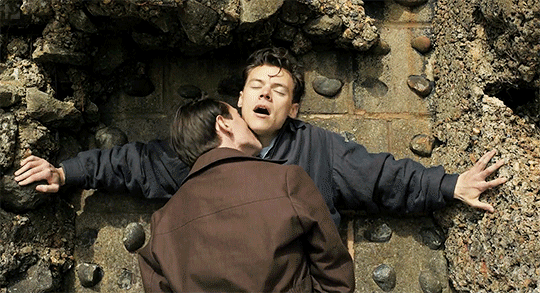
The Moon's association with fluidity, hidden depths, and possessing understanding of emotions and identity makes these actors particularly adept at portraying complex, non-traditional roles (they are great at portraying emotions at all levels of intensity in general, with a prime example being Leonardo DiCaprio [Hasta moon and Asc. moon in 1st house]), who is known to be a phenomenal actor, almost shapeshifting into whatever a movie expects of him and displaying deep, powerful emotions). However, that being the case, Ketu and Rahu might still be more prominent when it comes to this trope of casting straight men to play gay roles, possibly due to homosexuality often being seen merely as the act of having sex with other men, rather than an intimately personal aspect of identity that has an impact on all areas of an individual’s life. This has the effect of reducing gay characters to straight men more willing to engage with ideas seen as non-conventional or morally perverse (more commonly associated with Rahu and Ketu), while still maintaining their straight charm that appeals to mainstream audiences. It is easier to depict gay men as "devouring" or Ketu-like, as seen in associations with Mula Nakshatra, which is related to the act of excretion from the anus, but this narrow depiction overlooks the complexity of sexual orientation, reducing it to pure physicality of external behavior. It fails to acknowledge that being gay encompasses a broad array of emotions, experiences, and identities far beyond superficial characteristics. Moon-dominant mens’ ability to resonate with and express a wide spectrum of human experiences, including those that challenge conventional norms, is enhanced by their lunar characteristics, but these themes might also be more prone to attracting false representation due to widespread misunderstandings. I’d also like to make it known that I am aware that there are many gay and bi Moon, Rahu, and Ketu-dominant men as well; they just aren’t nearly as common and hardly, if ever, get casted in the kind of deeper gay roles I'm referring to.
Continuing this exploration, it's evident that the very qualities that lend Moon-dominant men their depth, intrigue, and warmth can also lead to significant challenges. The Moon's inherent receptivity endows these individuals with a remarkable adaptability, which, while often a strength, can manifest in less positive avenues. Their exceptional ability to influence perceptions and beliefs, a direct result of their emotional responsiveness and innate understanding of the mind's energies, can become problematic. In certain circumstances, this lunar influence may veer into darker territories with one major potential downside in particular being emotional manipulation, where their intuitive grasp of human emotions can be misused for personal gain or to sway others unduly. Their innate power over emotion and human psychology can lead them to engage in behaviors such as lying, espionage, cheating/betrayal, infidelity, illegal clandestine activities, and exploitation. The Moon's association with hidden aspects and the subconscious mind makes its natives highly skilled at navigating these activities, sometimes even leading them into antisocial or unethical paths, which can be seen in many different media portrayals I’ll cover later on. But for now, I will point to the personal life example of Ryan Philippe (Shravana asc. & Hasta mercury), who is notorious for his multiple instances of cheating on his wife and other subsequent partners, in addition to a history of drug misuse and allegations of domestic violence. An important thing to note when I speak about these things, however, is that while they can be masters of manipulation, Moon-nakshatra men do not possess complete control over the mind to the point where they always get people to do anything they want. Similar to the Moon relying on the Sun's light, their "power" actually depends on people willing to project onto and exchange energy with them, which can make Moon-dominant men extremely vulnerable, even more so than Moon women (people will instinctually try to defend moon women because they perceive them as being pure and innocent, unable to protect themselves; the same sentiment is not afforded to Moon men, who people think should be able to defend themselves with their physical power). In fact, Moon-dominant men often struggle to set boundaries due to a fear of direct confrontation as well as a desire to be what other people want of them, often worshipping the people they are closest to (they really want respect and attention from others and will endure harsh treatment or act untoward if it means getting that from someone they respect themselves, sometimes to an unhealthy extreme). That brings me to my next point of abuse... Whether inflicted or incurred, abuse (especially relating to domesticity and women) is another shadowy aspect of the Moon's influence in Vedic astrology, aligning with many of the experiences of Moon-dominant men in media and in real life. The frequent association of moon-dominant men with themes of abuse in media – be it as perpetrators, victims, or both – intertwines notions of vulnerability and aggression, showing the darker side that emotions can take, and subsequently, the darker side humanity can take as well. Overall, it makes sense why people often connect Moon men to ideas of abuse in media and in real life, such as with Evan Peters (Hasta moon and Shravana mercury) in “American Horror Story—Coven” where he was sexually abused by his mother (among other things; that show put him through it...), Christian Bale (Shravana sun) in American Psycho being abusive towards women, Tom Hardy (Hasta moon and Rahu) in “Peaky Blinders” being extremely violent and hedonistic, etc.
(Add-on: This is a bit of sensitive topic related to sexualization, so discretion is advised. Just as women traditionally face sexual objectification, Moon-dominant men may also encounter similar treatment due to their inherent passivity and receptive nature, leading to sexualization and other forms of scrutiny that stem from societal tendencies to view individuals who are more passive and receptive as feminine as being more accessible to take advantage of. This sexualization, particularly prevalent in the portrayal of these men in scenes of nudity [I've yet to find a Moon-dominant male actor who has not done a nude scene, even though many speak about how they did not want to do it at the time and felt uncomfortable] or in the adult film industry (an industry known for its connections with abuse) where I've found Moon men to be most over-represented in terms of planetary dominance, showcases a societal inclination to exploit those exhibiting traits diverging from traditional assertiveness.)
(GIF contexts: The first GIF shows Evan Peters in American Horror Story Crying. The second GIF is of Tom Hardy in Peaky Blinders smoking.)
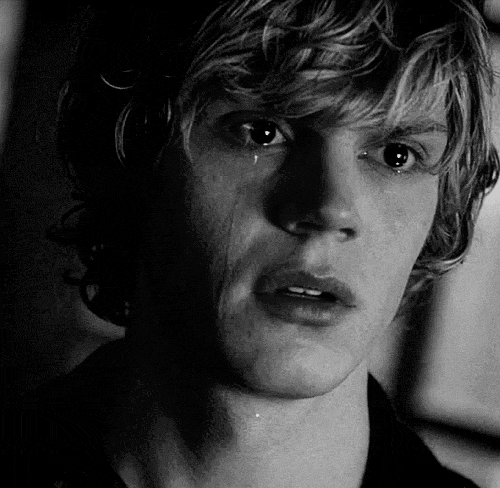

In the film industry, the energies of Moon-dominant men, characterized by their complex emotions, adaptability, and concealed depths, are astutely recognized by directors. This insight informs casting decisions, often placing Moon-dominant actors in roles that mirror the multifaceted nature inherent in them. Christian Bale's (Shravana sun) portrayal of Jim Luther in "Harsh Times" exemplifies this, exploring the darker recesses of the human psyche, a reflection of the Moon's association with concealed motives and intricate emotional situations. Similarly, Denzel Washington's (Shravana moon, Hasta asc.) performances in "American Gangster" and "Training Day" depict a tough exterior masking a softer core, Michele Morrone (Hasta sun & venus and Shravana rahu) in "365 Days" intertwines criminal elements with deep emotional entanglement, and Tom Hiddleston's (this one is super interesting because, while he doesn't have any primary moon placements, he does have Hasta jupiter & saturn— the moon nakshatra ruler and subruler of his chart plus Shravana Venus and ketu, so I consider him moon-dominant) Loki across Marvel films embodies cunning coupled with hidden vulnerability. Matt Daddario (see top of post) and Matt Bomer (Hasta moon, mercury, and rahu), in "Shadowhunters" and "White Collar" respectively, delve into the realms of a secret society of demon hunting & then crime/subterfuge with personal attachments to it, personifying the Moon's nature.
(GIF contexts: The first GIF shows Michele Morrone in 365 days shirtless and talking while looking down. The second GIF is taken from White Collar showing Matt Bomer talking frantically.)

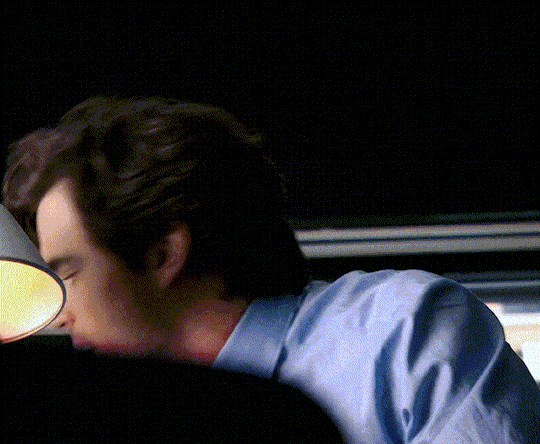
Zachary Levi as Flynn Ryder personifies this duality - mischievous yet sensitive, conniving yet protective, masculine yet feminine, seeking introspective depth yet maintaining material asperations, and so on. Followed by Henry Cavill's roles, particularly Superman and Geralt, further illustrate this theme of his invincible, hyper-masculine superhero persona of Superman veiling the sensitive, complex nature of Clark Kent that he must keep hidden through great discipline (The original actor for Superman Kirk Alyn was also moon dominant (Hasta sun and mars with a lot of his chart's energy tracing back to sun). One the other hand, Christoper Reeve– arguably one of the most popular actors to play Superman– has his Sun and Mercury less than one degree away from being in Hasta, but overall, his chart is still Sun-dominated with a lot of Uttara Phalguni and Krikita, which makes sense because one: it was old hollywood, and two: the reason people love him is for his portrayal as the hyper-masculine persona of Superman, which would have been closer to Reeve's true nature anyway. In my opinion, his portrayal as Clark Kent is kind of bad because he treats that like it is supposed to be his geeky alter-ego rather than the fact that he would have been raised as Clark Kent– the humble farm boy from Kansas, not as Superman. Anyway, rant over). And Geralt, who presents a facade of absolute masculine strength defeating monsters for a living and projecting a sense of detachment from others, all while concealing a deeper, more nurturing and intimate side of himself. These portrayals, necessitating depth and often grappling with themes of manipulation and other complex moral dynamics, go hand-in-hand with the Moon's influence on hidden emotional strata and ethical complexities. The performances of these actors align with the experiences of many Moon-dominant men, reflecting the nature of their personalities. (Thank you so much to anyone who read this entire thing! 🙂 I know it’s a ton of information to get through, so I do really appreciate any time and effort people put into reading this!)
#vedic astrology#astrology#astrology observations#nakshatras#zodiac#astro community#astro notes#astro observations#zodiac signs#astrology notes#vedic chart#vedic astro observations#vedic astro notes#vedic texts#vedic mythology#lagna#astro placements#astroblr#sidereal astrology#capricorn#virgo#taurus#moon men#moon-dominant men
204 notes
·
View notes
Text
🪞Inner Dialogue Diaries — Part One: Are Your Inner Thoughts Your Biggest Cheerleader or Harshest Critic?

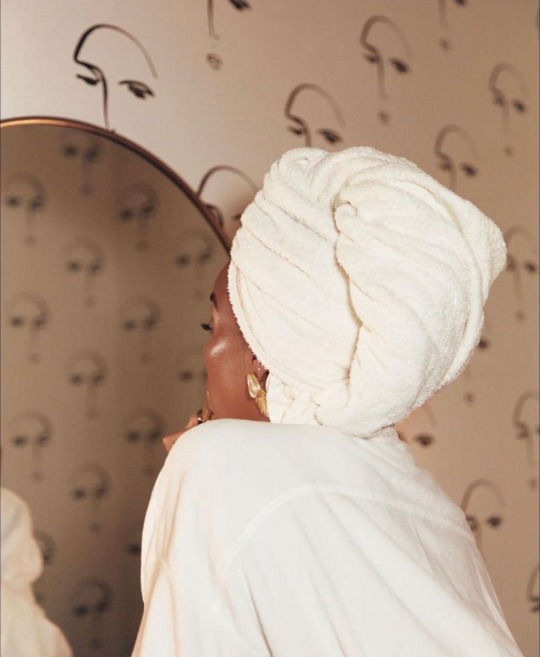
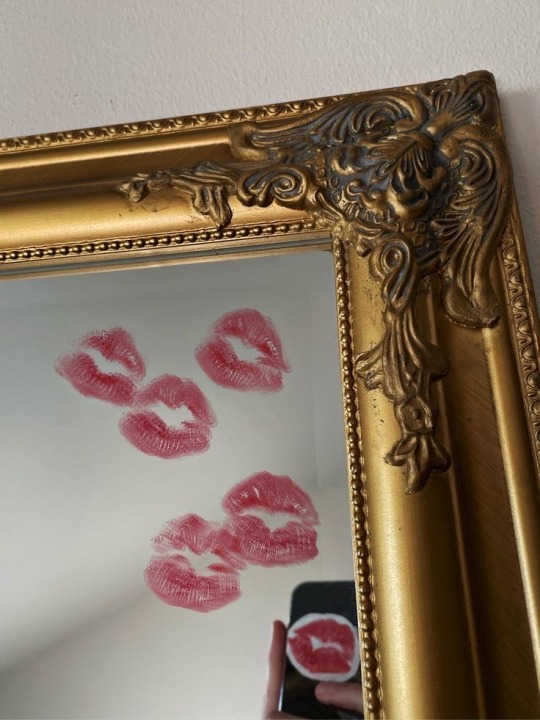


Hey Besties and Future Besties of B.F.S,
As your accountability partner, I think it's important to highlight all the struggles women face during their feminine journey and give solutions and tools to help you conquer those obstacles.
Our fellow Femininity and Level Up content creators are doing a wonderful job with helping women look and even act like their best selves. We realized that we don't often see the real conversations about the daily mental reprogramming that has to happen in order to let your feminine energy flourish✨
🌟 The P.V.N Method:
There are two ladies that most of us know of, heard of and even embody on a daily basis. I would call them arch enemies but one cares for the other and the other can care less about them. Who am I talking about? The infamous "Positive Polly" and "Negative Nancy" we all have had our moments with both of these ladies both externally and internally.
Who is Positive Polly:

Miss Positive Polly is very upbeat, encouraging and optimistic. She is always looking on the brighter sides of things and people. She is solution oriented and maintains a hopeful perspective even in challenging times.
She relies on her friends FAITH and CONFIDENCE, together they create a supportive and encouraging environment.
Who is Negative Nancy:

Unlike Positive Polly, the infamous Negative Nancy isn't so glamorous. She is actually very dull suffers from perceptual blindness which causes her to having to depend on her fake friends “The Debbie Downers” (Scarcity, Fear and The Past)
Together they tend to focus on the on problems, obstacles, and worst-case scenarios. The Debbie Downers are often critical and sees the downsides in situations.
The P.V.N method is the practice of identifying which posse your inner voice is akin to, this is how you will perceive everything you are doing, analyzing and believing about yourself.
Which Posse does your Inner Voice belong to ?
The Daily Reprogramming:
After identifying what side your thoughts are on (positive vs. negative) it's time to download this information into your brain. If you are normally pessimistic, This is a daily ritual, yes daily. Sounds exhausting but all of the greats became great because they had to do this very thing.
What To Reprogram?
Self-Awareness and Reflection: Recognize when your inner dialogue leans toward Negative Nancy or The Debbie Downers. Reflect on how these thoughts are affecting your actions and emotions.
Reframing Thoughts: Challenge negative thoughts and replace them with more constructive, Positive Polly-style affirmations. For example, if you think “I always mess up,” reframe it as “I’m learning and improving with each attempt.”
Building Positive Habits: Practice gratitude, celebrate small victories, and set realistic goals to reinforce a positive inner dialogue. This helps shift your overall mindset from self-criticism to self-encouragement. (Click Here For Our Habit Breaking Guide)
Seeking Support: Support is a big part of your femininity journey, commonly as black women we feel like we need to do everything alone bt thats not true! Sometimes external support, such as talking to friends, mentors, or therapists, can help counteract negative inner dialogue and promote a more positive self-view.
🚨 The Good News: There is an ultimate kryptonite to depleting your negative thoughts 💭
#feminine energy#postive affirmations#luxury mindset#self development#positivity#black women in femininity#healed black woman#healed femininity#self love#self love journey#black women#black beauty
106 notes
·
View notes
Text
Maybe I'm already too Kantpilled but I don't understand Aristotle's problem with correlation of objects and perceptual faculties. Correlatives come into being with each other by his definition, so if we have perception, we have something being perceived (objects). If, say, an animal is annihilated in perception, it is the case that we only have no perception of any quality the animal only, for that is the proper correlative of the statement. An improper correlative would be to say all perception is annihilated (or, phrasing the incorrect statement positively, a perception of one animal is all of perception.)
But to then problematize that perceivable objects exist prior to perception seems weird. Those seem like unrelated statements! The correlative of a perceivable object is a faculty with an ability to form perceptions of a given perceivable object. Our ability to perceive also exists prior to the act of perception. The fact that perceivable objects can become perceived, and thr fact that our ability for perception is acted upon, seems besides the point. The fact that objects exist prior to perception is also besides the point.
Maybe an issue of translation? I'm at work. Maybe I'll still care to look this up later
81 notes
·
View notes
Text
Last week, in my Discord group of about 60 lifelong friends (and I mean really lifelong, danced-at-the-wedding, phone-call-for-the-divorce friends), one person posted a "from the river to the sea" meme they'd found on Twitter. I made clear that it was a huge problem, that person apologized and deleted it, everyone else seemed supportive and understanding.
And surprised.
Because none of them - not ONE of them - had ever heard the term before, nor knew what the river or the sea were, nor had any clue it could possibly be seen as threatening. That included the person who posted it in the first place. These are all college graduates, some of them with post-college degrees, all liberal Democrats who agree with everything John Oliver ever said.
The discussion went as well and as supportively as it possibly could have, but I am still floored by how.... remote the topic was from all of their lives. Including how remote it was for other Jewish members of the group (though I can't help but notice that those other Jewish members are unaffiliated and don't have kids).
I bring this up because it shows that social media really can exaggerate the scale of threats we perceive and experience. And if you had told me that more than a week ago, I would have cut you off and said "Of course, I know that, I'm not naive" - but it still would never have occurred to me that it could reach such a degree. How constantly reading updates on war and hate and protests and threats really can give a distorted and inaccurate picture of the world.
One time on Reddit, I noticed a pro-Palestine account that was positively obsessed with the "boogaloo boys," a purported sub-set of white supremacists. This person mentioned "boogaloo boys" probably 80 times a week, in the context of how their racial civil war was about to begin and would target Arab-Americans first. And it really began to look weird - a focus beyond their importance. I'm sure nobody would ever want to meet a "boogaloo boy," of course, but I also think this person made more posts about that group than the number of members there are in the actual group.
Has anyone outside age 18-23 and outside a college campus ever met a member of SJP? They're pretty horrible people, but they go tabling right next to all sorts of splintercranks who dissolve once you graduate.
There is a real perceptual, emotional downside to seeking out hatred and threats so one can announce "Aha! Look at all this hatred and threats!". It is not only privilege that allows people to avoid some problems and conflicts - it can also be demographic, political reality. It is important to know who hates and threatens us - and also to remain members of "the reality-based community." Internet discussions are not real life, college campuses are not real life, internet discussions among college students are the least real of all.
Scott Alexander touched on this - how certain political beliefs can be avoided even without conscious effort:
According to Gallup polls, about 46% of Americans are creationists. Not just in the sense of believing God helped guide evolution. I mean they think evolution is a vile atheist lie and God created humans exactly as they exist right now. That’s half the country.
And I don’t have a single one of those people in my social circle. It’s not because I’m deliberately avoiding them; I’m pretty live-and-let-live politically, I wouldn’t ostracize someone just for some weird beliefs. And yet, even though I probably know about a hundred fifty people, I am pretty confident that not one of them is creationist. Odds of this happening by chance? 1/2^150 = 1/10^45 = approximately the chance of picking a particular atom if you are randomly selecting among all the atoms on Earth.
About forty percent of Americans want to ban gay marriage. I think if I really stretch it, maybe ten of my top hundred fifty friends might fall into this group. This is less astronomically unlikely; the odds are a mere one to one hundred quintillion against.
72 notes
·
View notes
Text
Xiao Zhan Marie Claire Cover story | Rules & Inches

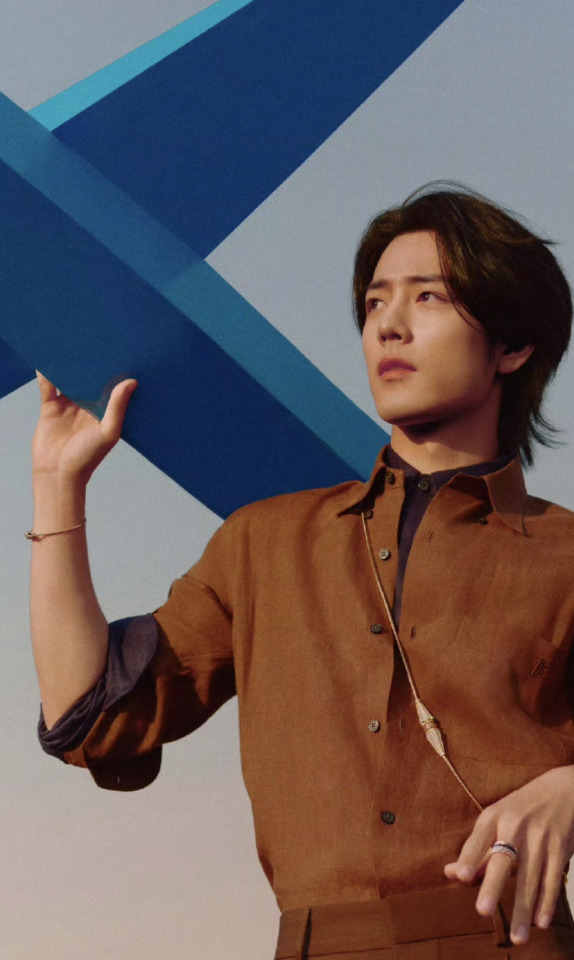
When I say the word "future",
The first syllable is in the past.
When I say the word "silence",
I've broken it.
When I say the word "nothing",
I have created something that nothingness itself can grasp.
——Vislava Szymborska, "The Three Strangest Words"
Xiao Zhan held up a handheld fan to dry the sweat from the filming. When the photographer signaled the start, he stepped forward, stepped back, walked again, and continued to retreat. The props on his back are like airplanes, and his eyes are constantly searching for the camera, and he is like a naughty child exploring an unknown world. Every time I go back and forth, I am thinking about the more refined possibilities between advancement and retreat.
It’s hard not to notice Xiao Zhan’s sense of proportion. When being interviewed, he has a catchphrase: "Can you say this?" Or, as if to confirm himself, "You can say it like this." He also reflects on himself all the time. For example, I repeatedly remind myself not to let my performance become inertia. Once I get used to it, it will develop into terrible inertia. For example, he often emphasizes that he doesn't like to make mysteries, and he may not understand many truths. What he shares is only his sincere daily feelings. For another example, when he heard a crew member commenting on his "striving for excellence", he responded that he had not yet reached "refinement" and only wanted to "benefit".
Xiao Zhan spoke slowly and eloquently. He did not have a thunderous and fiery personality. He chatted calmly and had the ancient style of a benevolent gentleman. He's not tight at all. They chatted all over the world, and when they got to the point where they were enjoying themselves, they naturally leaned back on the chair and gently held their right legs with both hands. The content of the chat ranged from the unchanging emotions contained in the golden songs of the times to AI, the views on human beings, as well as his own performances and life experiences.
In 2023, three TV series starring Xiao Zhan will be broadcast one after another. He played the colorful father, the lonely and cold eldest son, and the newcomer who struggled in the workplace. Every time he enters a crew, he will dream about real scenes and real pressure related to filming. After the dream is over, he sinks himself into the heart of the character and performs it, leaving vivid memories and feelings.
There is a ruler in the heart and a square inch outside the body. What's appropriate is Xiao Zhan's inner view, his precise view of work, life and himself. A few inches away is Xiao Zhan's external perspective, his perceptual understanding of the past, time, space and the world. Between the length and the shortness of a ruler, heaven and earth appear.
======
Three TV series have been aired and new dramas are being filmed. For actor Xiao Zhan, 2023 is a fruitful year.
Occasionally, when he looks back on his career as an actor, Xiao Zhan will be in a daze for a moment. In the blink of an eye, it seems that he has been there for a long time. Almost every time he shoots a movie, he has a routine: dreaming. I dreamed about memorizing lines, dreaming about acting against a director, or even dreaming about taking a math test, but couldn’t solve any of the questions on the paper, and then I woke up with a start.
Xiao Zhan felt that this was caused by pressure, and he accepted it calmly. Perhaps there is another reason. Deep down in his heart, he does not regard himself as a qualified actor, but always puts himself in the position of a newcomer, with an attitude of learning and exploration. Therefore, every time he goes to a crew, he has the experience of starting all over again.
Xiao Zhan is very wary of inertia. Sometimes he also advises himself not to be under so much pressure, not to get into trouble, and to try to be more relaxed. But once he realizes that he starts to rely on performance models, experiences and habits, he will remind himself that taking things for granted is dangerous. After a long time of inertia, inertia will occur, and inertia will lead to "taken for granted". Therefore, every time he interprets a role, he always has to gain some freshness.
Xiao Chunsheng in "Where Dreams Begin" is a character full of freshness. Because there are extremely obvious differences between him and Xiao Zhan himself. Xiao Chunsheng is a young man in Beijing in the 1970s, which is completely different from the era and environment in which Xiao Zhan grew up.
Military coats, "28 big bar" bicycles, the ice surface of Shichahai, and the transformation from a young boy to a middle-aged entrepreneur are not familiar to Xiao Zhan. To this day, Xiao Zhan can still see "traces" of Xiao Chunsheng: when it comes to the character Chen Hongjun in the play, he always says "Hong Jun'er". Those were the Beijing movies and Er Huayin that I practiced when filming started. "Ouch" and "Ouch" were all words on Xiao Zhan's lips.
The language, objects and sense of time are all okay. For Xiao Zhan, the biggest difference from Xiao Chunsheng is his personality. He is an "I person" who enjoys being alone, while Xiao Chunsheng is the complete opposite. He makes many friends and loves to socialize too much. Measured by today's standards, this extreme warm-heartedness often means a lack of a sense of boundaries. "The times are developing faster and faster. Today's young people are living a fast-paced life and will not easily cross the boundaries of getting along." Xiao Zhan commented, "But Xiao Chunsheng is an extremely meddlesome person, so it is easy to offend Someone else." When he read the script, he was quite intimidated by this role and felt that it would be difficult to act like it. But after hesitating for a long time, a thought suddenly caught his attention: Maybe the qualities we care about today contain exactly what we need.
Fresh, this is Xiao Zhan’s summary of Xiao Chunsheng and his contemporaries. "If you hate them, you hate them. If you like them, you like them. Don't you think the colors of each of them are particularly bright?" he asked. Even now, when thinking back to some scenes in "The Sea in Dreams", he still feels that the characters are shining brightly and vividly.
After playing Xiao Chunsheng, a person who is far away from current values, Xiao Zhan also gained something in terms of mentality: don't be afraid of making mistakes. He said: "A truly lovable character will have imperfections." During the filming, he once asked the director if it was particularly annoying for Xiao Chunsheng to worry so much about others. The director told him that it was precisely because of this "annoyance" that he was Xiao Chunsheng, and "annoyance" was his charm.
The director's words suddenly awakened Xiao Zhan. Sometimes he would fall into a strange circle, hoping to avoid and correct the imperfections of the character. "When you change it like this, the character itself loses its charm." Xiao Zhan said, "So I think you should not be afraid when doing homework for the character. Be enthusiastic when you should be enthusiastic, and cross the boundary when you should. If you always consider the character's The shortcoming is, thinking about what will happen if the audience scolds me, it will be difficult to act." Because actors play roles, not personalities.
Not being afraid of flaws, to some extent, also means the courage and ability to seek truth. "Sunshine by my Side" is Xiao Zhan's first appearance in an urban workplace drama. His reason for taking on this drama is simple: modern dramas are too close to reality and everyone is living it, so it is difficult to perform it to make everyone believe it. Because he was unsure and confident, he firmly believed that he would learn something after "gnawing" it down. Thus, the character Sheng Yang came into being.
"Sunshine by my Side" made Xiao Zhan realize that urban dramas rely heavily on the cooperation between actors. Because it is more life-like, every point will not be stuck, and the lines and performances will be slightly adjusted. "We are all living people, and we do not exist to maintain a persona. What everyone does, says, and expresses emotions are natural, reasonable, and flowing. If you change, my performance will also change. It will change accordingly." Xiao Zhan said that this kind of creative coupling eliminates the possibility of actors being rigid and mechanical, so it is a fresh and fun experience.
Sheng Yang is a designer, which happens to be the job that Xiao Zhan has done. With personal experience, flexibility during performance can be guaranteed. "When Shengyang wanted to draw the design drawings, I would actually draw them there. Sometimes I would tell them, art teacher, your layers seem to be locked and I can't move." Xiao Zhan recalled, " Because it's his own life, he's better at it. Can you say that? Okay." He never forgets his sense of proportion when it comes to his true feelings.
Xiao Zhan is no stranger to TV series with fantasy themes. "Yuguyao" is the most recent example. For him, acting in a play with such an imaginary background requires a process of starting from scratch. Facing a green screen, if you want to imagine extreme weather or breathtaking scenery, you need to create it yourself. As for whether the state is real and whether the emotion is subtle, more often than not, one has to trust the evaluation made by the director behind the monitor.
Whether it is a costume drama or a modern drama, Xiao Zhan always has a clear understanding of the script and characters. "There are always few good things at any time, which is why people always say that they are rare." He recalled his observations over the years, "Some scripts may be considered good by the industry, but the market feedback may not be so good. Everyone What is the definition of good? Is it good sales or good word-of-mouth? It's hard to judge." Therefore, what he can do now is to return to his own understanding and feelings and choose what he thinks is the best. Role. As for what role he most wants to play, Xiao Zhan said: "I have been mentioning it for many years, a cute and charming villain, if I get the chance."
=======
When reading the script of "Where Dreams Begin", Xiao Zhan's mind would be filled with photos of his parents when they were young.
Dad is riding a bicycle, and mom is sitting in the back seat, wearing a red skirt and a white shirt. When passing a big rock, my father took a photo of my mother as a souvenir. She smiles brightly in the camera, looking like a bright girl. When it was his turn to play the role of his parents in their youth, he tried his best to restore the freshness and even madness of youth. He did not want to deliberately portray the story in a rigid and serious direction just because it was a story about his father's generation.
Xiao Zhan seems to have a special sense of time. He is nostalgic. Whether singing in variety shows and evening parties, or listening to them in private, he always has a preference for old songs. They are memorable, rich in meaning, and give him space to think.
When he was a child, he didn't have much pocket money, so Xiao Zhan would go to the video store to rent CDs, or exchange CDs and tapes with his classmates. The prices can still be clearly remembered to this day. To this day, he still has the CD player and Walkman he used back then in his home. Sometimes, he returns to wired headphones because they are convenient and easy to find. In the dead of night, he would occasionally think of objects that were gradually disappearing in the torrent of time. Being alone, with his heart flowing, is his comfortable state.
Xiao Zhan said that he is a very homely person and has to stay at home. During his spare time, he just works out and watches movies. He never regards watching movies as a task. He watches everything regardless of genre, whether it is popular movies such as popcorn movies or niche movies such as art films. Recently, he watched "The Fall", the best film at the 2023 Cannes International Film Festival.
Around New Year, he often revisits "Love Actually" and watches it again every two or three years. The reason is also very straightforward. The family, love, and friendship in the movie all convey truth, goodness and beauty, which makes people feel heart-warming when watching them.
"Don't you think that the emotions between people have never changed? Old movies will always be read and watched, and old songs will always be listened to over and over again, because the emotions sung by truly classic works remain unchanged through the ages. Only sincerity can move people." Xiao Zhan seemed to have a sudden inspiration and compared it with AI, "I think AI cannot replace humans. Maybe its technology can one day surpass the limits of humans, but that kind of complex emotions , humans far surpass computers. It can be said that humans are the most accurate, mysterious, and complex supercomputers."
Xiao Zhan will pay attention to AI, just like he pays attention to all new things in the world that are deeply related to people. He watched the news and read things written by AI. The depth of thought and logic of thinking made him incredible. Perhaps, in some job competitions, the threat of AI to human beings is already close at hand, but he still firmly believes that AI cannot replace face-to-face communication between people, whether it is immediacy or complexity.
When these distant concerns about new things are temporarily put aside, Xiao Zhan also has his own expectations for the world.
When filming "Ace Troops" a few years ago, in order to play a soldier who was concerned with the national image, Xiao Zhan observed and trained in the army for more than a week. He got up at five or six in the morning every day and ate and lived with the soldiers. After performing this play, he felt the cruelty of war and understood the hard-won peace. "I cherish my current life more. This is the truth." Xiao Zhan said. Therefore, the current vision of world peace may also be related to infinite distances and countless people.
As for his expectations for himself, he outlined it more simply: "I have done very well in 2023, and I hope I can maintain it." After thinking for a while, he added: "In 2024, I hope to love myself more and care more. Some of my own feelings and thoughts. This sentence is not only for myself, but also for everyone."
In Xiao Zhan's mind, he is different on screen and in real life. In private, he will not modify himself too much, nor will he dress too brightly. He just wants to be natural and true to himself.
"Just like the current chat, just keep it in this comfortable state. I won't change my face and play another person." Xiao Zhan said, "It's too tiring. Too tiring." He repeated twice all over.
A poet wrote, "My heart is slightly larger than the entire universe." Outside Xiao Zhan's small space, there is the restraint of "strategy" and the vastness of "universe".
LINK TO THE ARTICLE
#xiao zhan#accio victuuri translation#what a busy day wtf#what an insightful piece!!!!#OMG NOW I WANNA REWATCH LOVE ACTUALLY!!!!!#and yes i love the era of cds!!!!!#i can totally relate to the nostalgia cause i’m one year older than him#and i love that they talked about AI
79 notes
·
View notes
Text
Tidbit: Placronym Pixelation

So you got this fresh placroynm that you don't want engraved with a sophomoric name? Not a problem. You can reject that stupid shit with a pixelize/pixelate filter.
Photoshop
First, you will have to make two more duplicates of your name text layer, so three text layers in total. One for when it's first displayed, one for the first frame of pixelation, and one for the second frame.
With your first duplicate layer selected, go to Filters>Pixelate>Mosaic..., which is a terrible name for it, but hey, I'm no Photoshop developer. Set the cell size to 11.

For the second duplicate layer, set it to 14.
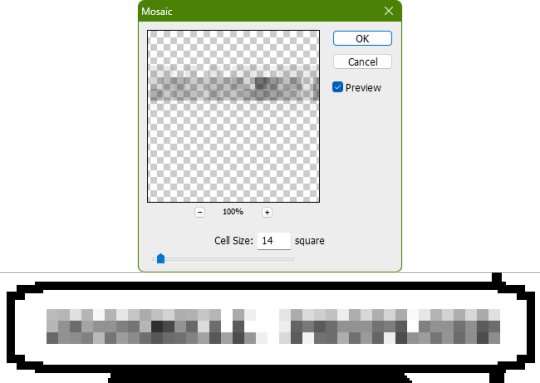
GIMP
Pretty much the exact same steps as in Photoshop, this time the filter is located under Filters>Blur>Pixelize...


I would suggest right-clicking on the text layer and choosing Composite Space>RGB (perceptual) instead of the default (Auto), or going to the top-right corner of the Layers tab and switching the group of blend modes from Default to Legacy. Basically, doing so will make the semi-transparent pixels as dark as they are in Photoshop, otherwise they will appear too light.



Check out the read-more link below for bonus information on easily animating the name being typed out in Photoshop.
ADDENDUM
Typing animation (Photoshop)
Photoshop's frame animation timeline makes doing this a breeze. First, add a layer mask to your text layer. This will add a white box next to the layer's thumbnail.

With that layer mask selected (click on it and it will be highlighted in the layers tab), use the marquee tool to make a rectangle selection around the text, then use the paint bucket tool to fill it in with the color black. This will make the text invisible until the layer mask is moved.

Go to Window>Animation if you do not already have the animation timeline open. Click on the little sticky note icon to duplicate the first frame. In newer versions of Photoshop, you will probably first have to click on a button that reads "Create Frame Animation", and the duplicate frames button icon is the "+" in a little square.
Making sure you still have the layer mask selected and not the entire layer, use the move tool and arrow keys to move it all the way to the right, revealing the text on the second frame you've just made. Don't move it too far off now.

Move the typing cursor layer to the right as well, except you don't have to move it all the way at the end, only where it will be last seen.

Make the typing cursor layer visible on the first frame, and not visible on the second.
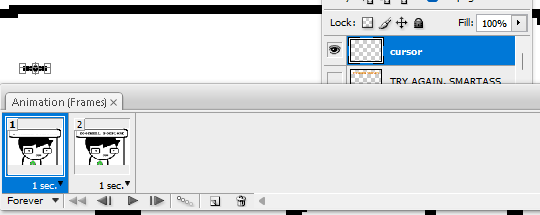
Select the first frame the animation and click on the tween button. This will add all of the frames in between the first and the second one for you. Make sure you only have "Position" checked under "Parameters". For the numbers of frames to add, here's a neat trick for finding the right amount: count the amount of letters in the name. "ZOOSMELL POOPLORD" is 16 letters, so add 16 frames.

Most of the work is already done, though there might be a couple frames that will need some minor tweaks. Just use the move tool and arrow keys again to finetune the layers' positioning.
This is why it was important to not move the layer mask too far to the right away from the end of the text. Tweening the position spaces it out linearly, evenly, so the farther away the end goal is, the more space each frame will use. Thankfully the font this panel uses is mostly monospaced, and I got a little lucky with my positioning, so I needed to only adjust three or four frames. Way less tedious than having to create each frame of animation myself, at least.

To change the frame delay (the time duration each frame takes up) of the newly created frames, click on the first frame you want to retime, hold down the Shift key, and then click on the last frame. This will make a selection spanning all frames in between. Click on the little dropdown arrow and select 0.1 seconds (100 milliseconds).

Here's the original panel:
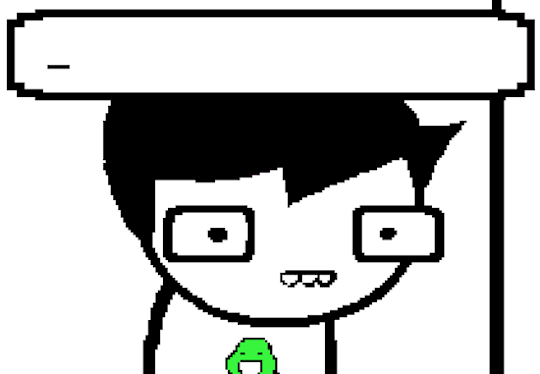
And here's my recreation:

Here's the PSD, too.
76 notes
·
View notes
Text
Thinking on trans intercommunity issues and how utterly abysmal we are, like two brick walls we're both building leaving anyone who doesnt fit the narrative in the middle.
And I think one issue is the lack of clarity between genders as identities and as political, social structures.
I don't think it's real helpful to wax on about trans men being men, not being men, 'socialisation', misandry, etc etc without clarifying and understanding gender as not just like, an aesthetic, a personal framework, but as a vessel of societal structure.
I think, for trans women in particular, and transmisogyny as a (imo flawed but not baseless) concept, where identifying as a woman, presenting as a woman, is a political position of vulnerability, as well as an identity.
The reverse, and here is where I think a lot of hurt comes from, is that the opposite is laregly untrue for trans men, because... Well, the patriarchy and misogyny suck. We / they reject it.
Identity, and political social role, are incongruent for most trans men. Rejecting this paradigm is, to me, the source of (again flawed but useful) concept of transandrophobia- A type of man who embraces masculinity, manhood, identity, but rejects the corresponding structural role.
Conversely of course some trans men are misogynistic...? No, that's not right to me. Everyone is misogynistic because we live in a misogynistic society.
Some trans men embrace the structural role. They are not the focus of transandrophobia because they do not contradict the system. Presumably, they benefit from this.
This is I think where the source of 'misogynistic trans men' comes from...
But as detailed I think this is a systemic issue, not a trans or gendered issue. Women are plenty misogynistic where it benefits them- it is transphobic to suggest trans men are uniquely prone to this because of their gender.
Of course I think society pressures trans men into fulfilling their expected role- Specifically, with the intention that they will fail.
This is unique to trans men systemically (but not socially) as trans women are already seen as failing at their intended structural role- succeeding as a woman is seen as accepting their lesser status.
In a misogynistic society, you can fall, but not rise. (Socially however we are all pressured to perform- but I feel this is different.) and so a trans man, in a... less transphobic society, is accepted as a man if they check the boxes.
But as detailed, to check the boxes is to be complicit in patriarchy and misogyny as systems.
Trans men are uniquely discriminated against, even or especially by 'trans-friendly' spaces, because their identity is contradictory to their chosen role.
Trans men whose identity and role matches, pass the test.
Therefore... no trans man can pass *systemically*. It is not possible. Not without upholding the system. And the system is not our friend.
It does not matter how easy or hard it is for a trans man to pass *socially* or *perceptually* because they will never be accepted on these terms alone. The system does not allow them to exist- transandrophobia is the result. It is the pressure to either lower yourself to the status of woman, or betray yourself.
And betrayal is not final- just as cis men need to perform to the system, perform misogyny, trans men are still trans, are still subject to transphobia, and so no matter their 'sacrifices', they will never be free. There is always another checkbox.
To bring it around... Honestly? Yeah, I think trans women 'have it worse'. I worry about anyone who presents like that to society, as society is particularly and remoreselessly cruel to them.
But trans men are not unique forces of misogyny or patriarchy. The suggestion... is transphobic. When you say these things, you are actually *agreeing with the system* that they should fulfill their role.
There is no shortage of voices that want us / them to shrivel up and shut up so we / they stop being living contradictions.
There is also no shortage of voices insisting we 'man up' (a neverending pursuit) and fulfill the role we're expected to. Acceptance in the patriarchy is conditional, and the condition is self-annihilation.
Those who choose this are, while tragic and pitiable, fully culpable and complicit. But not monstrous either. It is after all what everyone wants and expects.
This dynamic is complex, and the concepts of gender, passing, presenting, sex... I think we are hurting each other because the system has been neglected in the conversation. I think this is what transmisogyny attempts to address, but... well, it neglects the unique systemic pressures on trans men.
So is transandrophobia the solution as a concept? Honestly neither works. I like transunity as a term but its still underdeveloped and evidently hasnt fostered much unity.
Misogyny is not the force at work here alone. Misandry is not the missing piece because it is not systemic.
But the patriarchy is. And no one is exempt from that.
(Additional reblog)
Not a fully formed thought but ohhh... Connecting this to the nonbinaryness...
By my thought pattern, if trans men cannot truly pass without adhering to a patriarchal misogynist system, trans men who do not or dont want to pass are inherently nonbinary.
(Not in an identity sense- but in a perceptual, Faggot-as-a-Category way)
And I think this approaches a difficult and very messy issue in that, it is inherently enbyphobic (exorsexist?) to treat trans men as men hierarchically.
This is why transmisogyny, to me, while valuable, is not a full model for the situation. It neglects the intersection of misogyny and transphobia by neglecting trans men's hierarchical pressure to conform to the system.
Trans men cannot be exempt from these forces. Any trans man who does not face misogyny is transphobic, because the system is transphobic.
You can't cleanly dissect trans men as a hierarchical phenomena untargeted by misogyny, without agreeing with the system that manhood is inherently and innately powerful and superior.
I want to say 'most trans men reject the patriarchy' but I don't know that. I'm an optimist, but it is undeniable that this stance is not universal.
I, again repeating myself, think this is a systemic issue, not an issue with identifying as a trans man. Its more akin to radical feminism ironically, whereby power is gained by aligning with the hierarchy, regardless of ones position on it. The status quo is maintained.
To try and wrap it up... Trans men face a unique intersection of enbyphobia and misogyny that cannot be separated. Chances are, there is also an intersection of this for trans women, but I don't have the voice to speculate on that.
Evaluating trans men as having privilege over trans women because men dont experiemce misogyny, is flawed. A trans man is a type of man that cannot both affirm transness and fill the role of man in a patriarchal system. Misogyny and transphobia is a package deal for trans men who reject the patriarchy, and this needs to be discussed and considered in the framework of transmisogyny.
Because I want to stress, this is not a 'trans men have it worse' argument- Trans men are not targeted by transmisogyny. This is a unique experience to trans women that *currently* has no comparable, systemic equivalent for trans men.
What I'm going to call 'intersectional transphobia' needs to be discusseed. Transphobia and misogyny are both gender-based forms of discrimimation, and so all genders are affected by it.
Transmisogyny is one part of this, (And so the insistence of its existence is not a threat to trans men) but there is more. However we need to consider a more complex dynamic, and a more nonbinary dynamic. Otherwise we will never agree with one another.
10 notes
·
View notes
Text
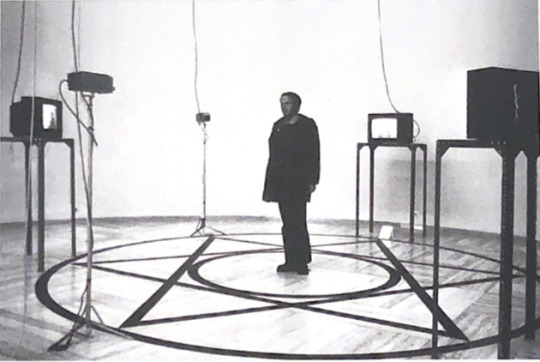
Peter Weibel
Beobachtung der Beobachtung: Unbestimmtheit (Observation of the Observation: Uncertainty) 1974
3 video cameras, 3 monitors
This immersive closed-circuit video installation art work allows the viewers to explore perception and self-perception from a third-person perspective. Three video monitors and cameras are altered and arranged in a circle, each faced toward the the centre of the room where the viewer is expected to stand. But once in the center, viewers find that while their image is always visible, they can see themselves only from behind. Thus while viewers are able to interface with the piece, and position their bodies in way that after their experience of it, they are always experiencing the piece as being observed and never as observer, creating a shift of perceptual expectation that is very unsetting. By making spectators the spectacles of their own gaze, Observation of the Observation: Uncertainty suggests that in surveillance society one is always being observed and that one's experience of reality is marked by pre-set patterns of seeing and being seen.
-from Art and electronic media / edited by Edward A. Shanken.
9 notes
·
View notes
Text
law; misguided loyalty 2
previous | next
doflamingo family!reader x law, angst
As a member of the Doflamingo family, you embark on a perilous mission to secure a supposed cure for disease, fervently believing in your dedication to Doflamingo.
Little do you know that Law, is also out seeking control of the cure.
When your paths cross in the New World, tensions arise as Law, aware of the dangers involved with the underground boss, tries to convey the truth about the misleading mission.
Will the ties to the Doflamingo family shatter, allowing both Law and you to find a new understanding, or will the echoes of the past prove too powerful to overcome? Explores the complexities of allegiance, trust, and the consequences of leaving behind a life bound by shadows.
[1.2k wc]

If it wasn’t the heat driving you mad, maybe it was the animals that had grown ten times in size due to the effects of the century fruit.
You had already shed your outer coat, the scrunched fabric just barely showing the Doflamingo's jolly roger.
The sun was just starting its descent from its palace in the heavens, casting orange hues over the viridian scape.
Of all the places it could have appeared, it just had to be a jungle island, teeming with bloodthirsty creatures and hostility.
You annoyingly cut your way through another enlarged python, the halves tearing apart before you, poison hit the ground with a light hiss.
There never seemed to be an end to the slaughter, and you were certain this was the worst way to go about it.
Taking a deep breath, you willed your heartbeat to slow, fluttering your eyelids shut.
The sounds of the jungle dulled in the back, as you extended your perceptual reach.
You could sense a pinpoint of energy just beyond you, something spherical that swirled with a symphony of cords.
It had to be what you were searching for.
You pushed past the fallen serpent, towards the lulling.
A few minutes later, you could feel the air practically electric, humming with the sensation of this century fruit.
It dangled preciously in a tree before you, unassuming and plain.
There was the item to your family’s success. Beyond that, it would be paramount to your success, your achievement.
Securing the century fruit meant cementing your position within the family. With this accomplishment, nobody would ever be able to say anything about you.
You reached for the fruit and--
A crackle of vivacity sang through the air, you whipped your head back to the direction it came from.
There was a subtle shift in the air, the faintest echo of a footstep, and a presence that made your stomach churn.
There was no doubt about it, there was someone else on this island.
You took another step towards the dangled fruit, the leaves quietly shifting underneath.
The spark in the air shifted into curiosity, reaching out to you. The ethereal current of haki rumbled over you.
Whoever it was on the island, whoever you hoped it wasn't, had sensed you.
Your fingers reached for the cooler touch of your sword.
The jungle was once again quiet, as if hushed in reverence.
The brush gently parted its way to reveal a figure bathed in the soft glow of the amber sunlight.
You saw his slender, tattooed fingers first, wrapped tightly around a long black sword.
He moved with palpable confidence, his dark shirt fluttering slightly in the breeze that hit like a held breath.
Trafalgar Law, the Surgeon of Death, scanned his surroundings carefully, a testament to his acute perception.
Strands of black hair fell across his face, partially veiling the contemplative expression that played on his features.
Finally, you caught his golden eyes as they moved from the ground to sweeping over you, almost luminescent as they caught the setting sun within them.
A breath caught in your throat.
His mouth fell slightly open in surprise. Law thought he recognized the faint haki surrounding nature the moment he pushed into the darker jungle.
It was a thought he had abandoned without much thought-- he had buried you deep in his memories with fervor and guilt, one peek could unravel him whole.
His eyes focused, drinking in the sight as if it was his first time, narrowing at the Doflamingo-looking transponder snail strapped to you.
"You want to take the century fruit back to Joker," he started, "is that right?"
You didn't move, your fingers still resting on the scabbard of your sword.
"Not going to happen." He frowned.
"Back off, Law, you don't know what this fruit means for my family," you shot back.
He furrowed his brow in response. Just like he had expected, the family had a death grip on your shoulder, he could almost sense the smiling Doflamingo.
You drew your sword, stretching out your free hand towards him.
The latent energy in the air pricked up, attending to your will. Small smokes of steam reflected smaller rainbows through the slicing sunlight, and it rushed at Law.
"Room," Law produced an unfamiliar blue sphere as his fingers spun in the air. He sliced at the steam with no avail.
How could he slice air?
He stumbled back as he felt a striking in his eyes. His vision clouded, the Surgeon of Death teleported away.
Law stumbled a few feet back, palming his eyes. As his vision slowly grew clearer, he was met with a strange sight.
Instead of on the island, he was back in dreaded Dressrosa palace. He grabbed at a table to steady himself, finding that his fingers would pass right through.
Right. That made him feel a little better.
He ran down the corridor until he reached a room. Passing through the doors, he almost choked at the sight before him, unready and uneasy.
The air suddenly seemed to thicken with a weight only he could feel.
His eyes focused.
Two little children, huddled in the corner of the dark room, whispering amongst themselves.
It was you, looking exactly like he had left you all those years ago. And...himself, comforting your sobbing figure.
The sight of you on the floor, those days of vulnerable innocence, and the remnants of childhood unlocked a cascade of emotions that had been carefully tucked away by Law.
Like a Pandora's Box, he could hardly control the parts of him that demanded acknowledgement and healing.
Law took a small step closer, full panic.
"I wanna go with you," you wailed. "Doffy is scary and I wanna leave with you and Cora," your words were barely understandable through the thick, rolling tears.
Law's breath hitched and he drew a hand through his hair, anxiously.
He could only watch as his young self awkwardly fumbled with the small mess before him. He could hardly believe it.
The scene at which he promised to return for you gnawed at him inside, turning his stomach into tatters. His heart jumped into his throat.
"That's enough."
A sharp voice rang against the dampened sounds in the room, and all faded away gently. The muted scene bled away and slowly turned into hues of orange and green.
The lushness of the jungle reminded Law where he truly was.
You bit your lip fiercely, the century fruit growing warm in your hands as you watched Law recognize his surroundings.
Law's breathing leveled out, and he took a step towards you. "I'm sorry I didn't come back for you."
Confusion flit across your expression, one that Law did not miss. "What are you talking about?" You asked, incredulously.
It didn't matter what this psycho was rambling about. You pulled out your transponder snail.
"Doffy?"
A quick reply came. His voice curled in sweetness as he said your name back.
"I'm done! Come pick me up." You lifted an eyebrow at the Law still struggling to understand, lost in the mire of his own feelings and reality.
"Vergo is closest to you, I'll let him know."
The snail hung up with a quick clack.
You smiled sweetly down at Law Trafalgar, "it'll be nice to have a gift to bring Doffy!"
Your excitedness was spilling over the edge. You could hardly contain yourself.
"Room."
Not so fast, you grabbed onto his arm before he could slip away. At the last second, his gaze met yours, and he smiled a little.
His other hand latched onto your arm, digging slightly into your skin. "Guess we'll both go, then."
Jerking back your body, your hand flew to your sword.
The lull of jungle faded into a low hum, dirt into wood, and the setting sunset into bright overhead lights.
"Captain!!"
Before you could strike, your whole body felt heavier, and you staggered to your knees.
A pair of gray handcuffs snapped around your wrists as you held yourself up with your arms, leaning over the floor, feeling sick.
You heard Law take a fast impact, and falling to the ground beneath you.
"Bepo stop, do you want to crush him?" An exasperated voice followed.
"Huh? Who's this?"
You couldn't bring your eyes off the floor. Overconfident with your own devil fruit powers, you had neglected considering Law's.
The century fruit's heat reminded you of its presence. At last resort, at least you could eat it, to save it from Law's hands.
#law x y/n#trafalgar law#trafalgar law x reader#trafalgar law x y/n#one piece#op law#op law trafalgar#one piece x you#one piece x reader#trafalgar one piece
36 notes
·
View notes
Text
Hrm hrm I hate that this is kinda becoming my Thing but this is my blog so I can do what I want-
Thinking on trans intercommunity issues and how utterly abysmal we are, like two brick walls we're both building leaving anyone who doesnt fit the narrative in the middle.
And I think one issue is the lack of clarity between genders as identities and as political, social structures.
I don't think it's real helpful to wax on about trans men being men, not being men, 'socialisation', misandry, etc etc without clarifying and understanding gender as not just like, an aesthetic, a personal framework, but as a vessel of societal structure.
I think, for trans women in particular, and transmisogyny as a (imo flawed but not baseless) concept, where identifying as a woman, presenting as a woman, is a political position of vulnerability, as well as an identity.
The reverse, and here is where I think a lot of hurt comes from, is that the opposite is laregly untrue for trans men, because... Well, the patriarchy and misogyny suck. We / they reject it.
Identity, and political social role, are incongruent for most trans men. Rejecting this paradigm is, to me, the source of (again flawed but useful) concept of transandrophobia- A type of man who embraces masculinity, manhood, identity, but rejects the corresponding structural role.
Conversely of course some trans men are misogynistic...? No, that's not right to me. Everyone is misogynistic because we live in a misogynistic society.
Some trans men embrace the structural role. They are not the focus of transandrophobia because they do not contradict the system. Presumably, they benefit from this.
This is I think where the source of 'misogynistic trans men' comes from...
But as detailed I think this is a systemic issue, not a trans or gendered issue. Women are plenty misogynistic where it benefits them- it is transphobic to suggest trans men are uniquely prone to this because of their gender.
Of course I think society pressures trans men into fulfilling their expected role- Specifically, with the intention that they will fail.
This is unique to trans men systemically (but not socially) as trans women are already seen as failing at their intended structural role- succeeding as a woman is seen as accepting their lesser status.
In a misogynistic society, you can fall, but not rise. (Socially however we are all pressured to perform- but I feel this is different.) and so a trans man, in a... less transphobic society, is accepted as a man if they check the boxes.
But as detailed, to check the boxes is to be complicit in patriarchy and misogyny as systems.
Trans men are uniquely discriminated against, even or especially by 'trans-friendly' spaces, because their identity is contradictory to their chosen role.
Trans men whose identity and role matches, pass the test.
Therefore... no trans man can pass *systemically*. It is not possible. Not without upholding the system. And the system is not our friend.
It does not matter how easy or hard it is for a trans man to pass *socially* or *perceptually* because they will never be accepted on these terms alone. The system does not allow them to exist- transandrophobia is the result. It is the pressure to either lower yourself to the status of woman, or betray yourself.
And betrayal is not final- just as cis men need to perform to the system, perform misogyny, trans men are still trans, are still subject to transphobia, and so no matter their 'sacrifices', they will never be free. There is always another checkbox.
To bring it around... Honestly? Yeah, I think trans women 'have it worse'. I worry about anyone who presents like that to society, as society is particularly and remoreselessly cruel to them.
But trans men are not unique forces of misogyny or patriarchy. The suggestion... is transphobic. When you say these things, you are actually *agreeing with the system* that they should fulfill their role.
There is no shortage of voices that want us / them to shrivel up and shut up so we / they stop being living contradictions.
There is also no shortage of voices insisting we 'man up' (a neverending pursuit) and fulfill the role we're expected to. Acceptance in the patriarchy is conditional, and the condition is self-annihilation.
Those who choose this are, while tragic and pitiable, fully culpable and complicit. But not monstrous either. It is after all what everyone wants and expects.
This dynamic is complex, and the concepts of gender, passing, presenting, sex... I think we are hurting each other because the system has been neglected in the conversation. I think this is what transmisogyny attempts to address, but... well, it neglects the unique systemic pressures on trans men.
So is transandrophobia the solution as a concept? Honestly neither works. I like transunity as a term but its still underdeveloped and evidently hasnt fostered much unity.
Misogyny is not the force at work here alone. Misandry is not the missing piece because it is not systemic.
But the patriarchy is. And no one is exempt from that.
#trans#transandrophobia#transmisogyny#transphobia#transgender#drakepost#this is so long and windy forgive me#hrmrmrm i wish i could speak more about nonbinaryness as an aspect. Im not even a man#the two terms are also flawed because they neglect nonbinaryness#its hard to even bring it in when the discussion is so binary#relatedly. see im politically a trans man. but thats not my identity. im perceived as a woman and i intend to be percieved as masculine#but im not masculine! its different#i struggle with it a lot but this feels right#i am trying to create a new role. alongside trans men who feel the same#but im not a man or masc#identity vs role... i think its valuable to discuss
8 notes
·
View notes
Text


The Noumenal Monad
Within the Polynon framework, nothingness is an undifferentiated cognitive space that precedes geometry and structure. It exists as a pre-geometric source, housing the unformed essence of all phenomena from which spacetime, and all its manifestations, arise. Imbued with primal noumenal potential, it is denoted as the state where all possible realities are latent, waiting to be expressed into an observable world.
A circle whose center is everywhere and circumference is nowhere.
The monad is a geometric construct that acts as a universal grammar of existence, mapping how the boundless noumenal potential transitions into perceptual and phenomenal dimensions while retaining coherence across all levels of manifestation.
The centre being “everywhere” signifies the Monad’s omnipresence as the locus of all potential states, embedded in every point of reality. The circumference being “nowhere” reflects its boundless architecture, transcending the constraints of space, time, and materiality, integrating infinite possibilities within a singular, cohesive structure.
The compactification process begins with the noumenal everything compressing into a singular phenomenal something, reflecting a specific instance or manifestation. This phenomenal something is inherently equal to the noumenal everything because it retains the entirety of noumenal potential, either in its un-collapsed state of infinity or as a collapsed singular “ring” dimension, compacted into a single cognitive focal point.
The only attribute of a point is that it marks position. Take away this attribute and in the unposited point we have a symbol of pure Being, the abstract noumenon, that which underlies every mode of phenomenal manifestation, every form of existence. It is at once All and Nothing, at once Absolute Consciousness and Unconsciousness.
B.W. Betts, Geometric Psychology or the Science of Representation
Or, as Fichte envisioned it, the line symbolizes the progression of consciousness—linear and sequential—while the circle represents its completeness and self-enclosure, encompassing all its dimensions. Thus, both the noumenal everything and the phenomenal something are expressions of the same essence, differing only in their state of manifestation and representation.
Together, they define the Noumenal Monad as a meta-structure that bridges these states of being. It embodies the continuum between the actual and the potential, compacting the infinite diversity of noumenal states into a singular conceptual dimension. This process is geometrically encoded, offering a scaffold for understanding how existence unfolds from an infinite noumenal source into the finite, perceptual realm, while remaining irreducible to either.
Continue reading
#geometrymatters#geometry#philosophy#philosophy of science#plato#kant#spinoza#fichte#consciousness#monism
22 notes
·
View notes